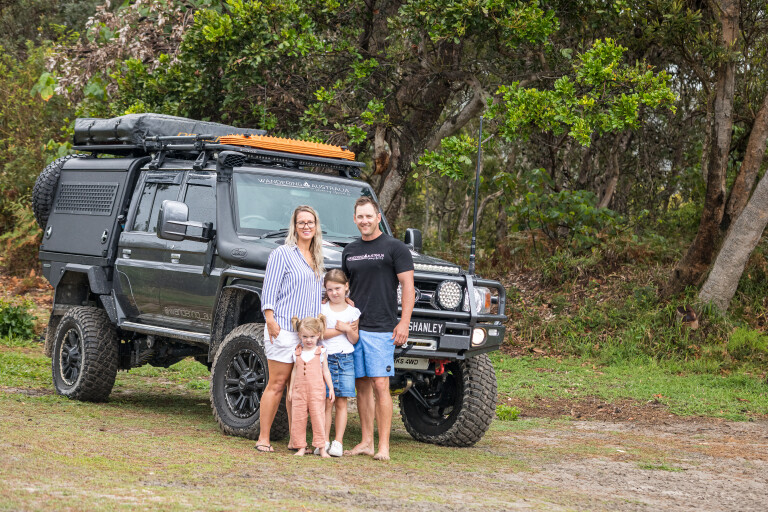
- Part 1: Victorian Grampians
- Part 2: Limestone Coast
- Part 3: Strzelecki Track
- Part 4: Bruder EXP-6 caravan
- Part 5: Great Southern Eyre
- Part 6: Nullarbor, Goldfields and magical beaches
- Part 7: The Great South-West
- Part 8: Dirk Hartog Island
- Part 9: Ningaloo Coastline
- Part 10: The Kimberley
- Part 11: What a year!
- Part 12: Karijini National Park
- Part 13: Bush versus beach
- Part 14: Catch-and-cook lifestyle
- Part 15: Meet-up at Rainbow Beach
- Part 16: Magical K'gari
- Part 17: Dollars and sense
- Part 18: Top tips for a family hike
- Part 19: Queensland's stunning Central Coast
- Part 20: Golden Outback
- Part 21: Building bonds
- Part 22: Southern Cape York
- Part 23: Ol' Tele adventures
Part 1: Victorian Grampians
The mountain ranges of north-east Victoria were one the highlights of our travels and definitely one of the most challenging 4WD treks of the first part of our trip.
We were wondering what we were getting ourselves into when local Victorians would say “the Grampians have nothing on Vic High Country” but we were up for the challenge.
We drove along the Victorian south coast and headed inland towards Dargo, with the Dargo Hotel being our first stop and meeting point with some mates.
The hotel is an icon and boasts a strong community feel. Despite the impact and anxiety the first month of COVID brought, we felt welcomed and part of the community having just walked through the doors. Dargo is a great but tiny community and well-worth a stop at the pub for a beer or for the night. We camped on pub grounds, with amenities available for a small fee.
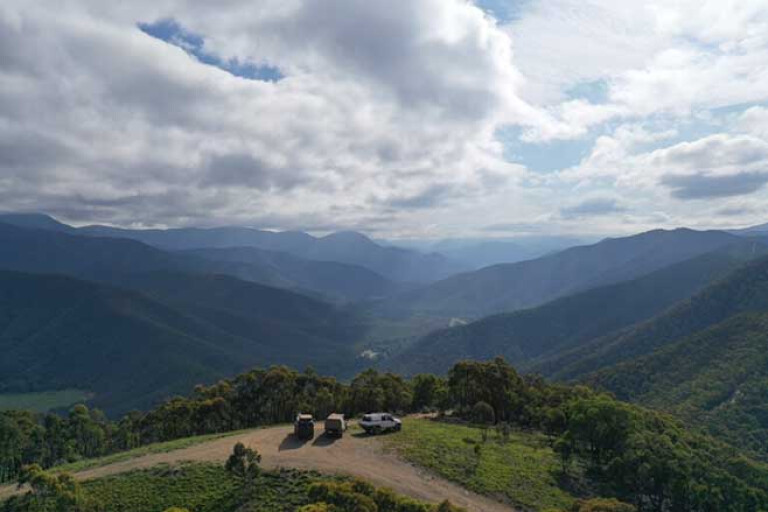
The following day we joined a convoy of four-wheel drives heading into the mountains to a beautiful free camp spot by the fresh, flowing creek at Talbotville. There was a drop toilet available but no other facilities and we had to be completely self-sufficient, which is how we like it. It was here we would base ourselves for a few days while we hit some 4WD tracks.
Our mates with us had some ATVs and, along with the 79 Series, they were put to good use. The best and most challenging drive we did in this part of our travels was the Billy Goat Bluff track. Whilst it is not for the faint-hearted, the views are absolutely spectacular, offering 360-degree views of the Victorian Alps.
Billy Goat Bluff track is only seven kilometres long, but as one of the steepest in Victoria it ascends 1200m and took us around two hours from camp to get to the top. When people said to us “You’ve just got to commit” they weren’t lying, and our 79 (as light as we could make it) reliably and steadily climbed the mountain.
At the summit, there is a parking area and we were very lucky to catch the sun starting to go down from the Pinnacles – a once in a lifetime opportunity. We took the same amount of time, if not longer, getting down, as we had to slowly creep along the loose, rocky surface to get safely back to camp.
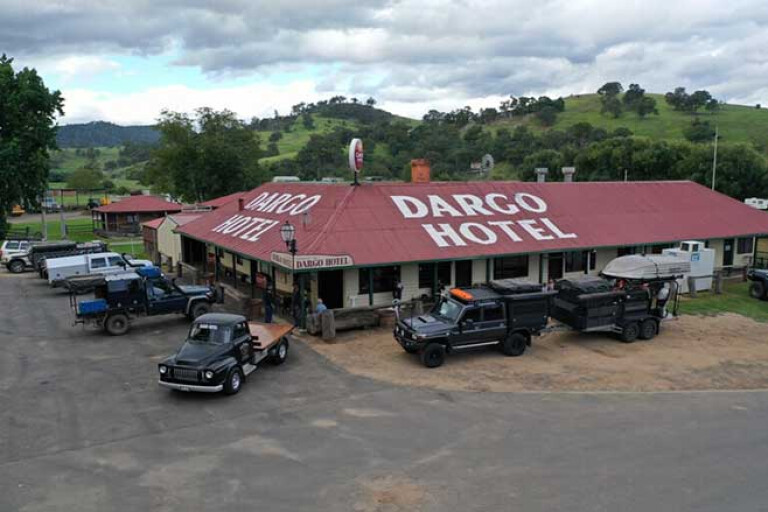
Once we tested out the tracks and many water crossings around Talbotville, we had an overnighter at Scotts Reserve just out of the quaint historical town of Woods Point. You can’t go through this town without the photo opportunity at the abandoned service station. It is still in its original form from the gold-mining era of the late 19th century when the town was alive with many shops and even a hospital. There are many small camp spots around here, complete with drop toilets and fire pits.
Our next stop was another High Country icon – Craig’s Hut, where we camped nearby. As we learnt while visiting, Craig’s Hut was originally built for a prop in The Man From Snowy River film and has been a tourist attraction ever since. We spent a sunset at Craig’s Hut, which again provided spectacular views over the mountains. Toilets are available but there are no other amenities; our RTT and a good campfire were all we needed.
LAP OF OZ: 79 Series + Bruder combo
It was so helpful to travel with Victorian locals who have experience with the area, and we would highly recommend ensuring you’re confident with mountain tracks before embarking on an adventure in the High Country. It definitely pushed the big 79 to her limits, but she didn’t let us down ... as always. For Brendan, our lover of heights and mountain ranges, this is an item well and truly ticked off his bucket list!
The Victorian High Country has spectacular views with an adrenalin rush included and is highly recommended … and there’s still plenty left for us to explore!
Part 2: Limestone Coast
Oh, how we have missed the South Australian landscape!
We have found SA to be an untouched wilderness. It’s almost like the South Australians have kept it a secret so it stays that way, which we completely understand. It was new to us to see farmland reaching to the sea, and the rugged coastline along the Southern Ocean was just awe-inspiring.
As we are now back in SA over on the western side, we have been reminiscing about our 2020 adventures on the eastern side of this fabulous state. Last year we travelled from Renmark over to the Barossa, down through Adelaide and the Fleurieu, fabulous KI and back up to the Limestone Coast along to Victoria.
While we have many stories and piccies from SA, we want to share our time along the Limestone Coast with you, where we decided to base ourselves for a week at Kingston SE, 30 minutes’ drive north of Robe.
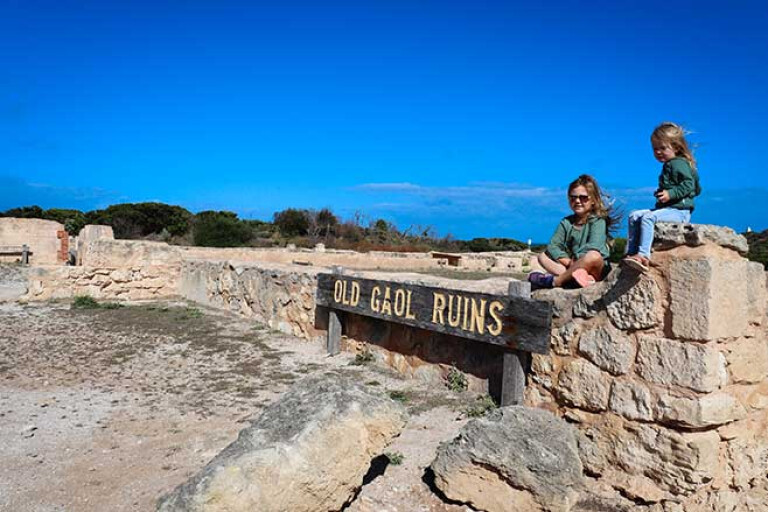
We stayed at a privately owned campground known as ‘Will’s Beach Shack’ owned by, not surprisingly, a little legend called Will! He has a 10-acre property just out of Kingston and for $10 a night there was private beach access, hot showers and water available.
Brendan had the opportunity to get the dirt bikes off the trailer and hit the sand for a 20km run on the beach to explore. We spent a fair bit of time in Kingston, stocking up on food, doing some school work and checking out the local jetty and beach.
Heading south on the Limestone Coast, we were then joined by Josh and Mikayla from @travelling.campers to hit the sand tracks from Robe to Beachport. It was certainly an action-packed day full of sun, surf and lots of beach driving. Again, an adventure most 4WD enthusiasts could tackle; although, a bit of sand driving experience wouldn’t go unnoticed.
Before tackling the tracks to Beachport, we checked out the vibrant coastal town that is Robe. Being the biggest and most well-known town of this area, Robe offers boutique shopping, cafes and a historic old pub with a great little beer garden. We went to see the gaol ruins which the girls loved learning about, and spent some time driving around the hilltops where there is breathtaking views and many walking tracks. While we didn’t stay in Robe, it would be a great place to base yourself for a week.
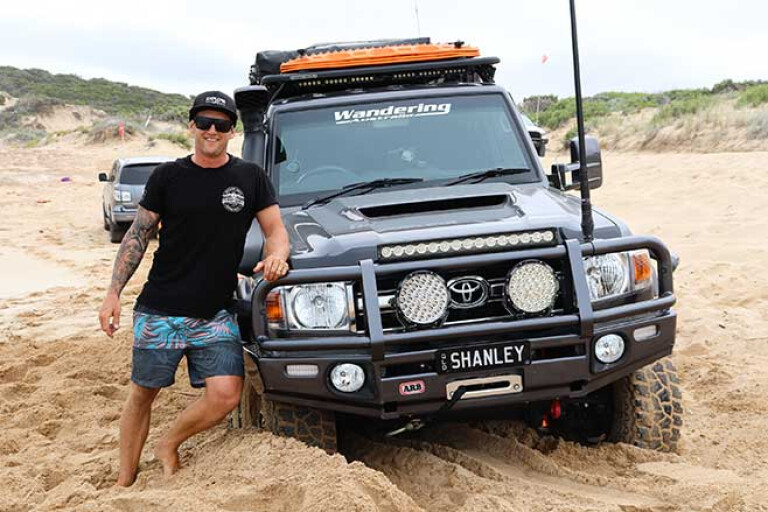
We left there bright and early, Mahalia coffee in hand (gorgeous little coffee and gift shop) and headed south, entering the beach at Little Dip Conservation Park. There were spectacular ocean views all the way along the coastline, and plenty of UHF banter to keep us entertained.
The beach driving is relatively straightforward with lower tyre pressures and tide knowledge, however closer to the water there were some very soft spots as Brendan discovered bogging the big 79 to its diffs. With the help of the MaxTrax and some good ol’ fashioned digging, we were back on track and headed for Nora Creina. This is a gated settlement of a few houses and, well, let’s just say, clothes are very optional.
BEST 4X4 TRACKS: Close to Adelaide
Just north of Beachport we spent the late afternoon playing around in the sand dunes where there is sand for days and we imagined careering around in dune buggies. Nevertheless, it was so much fun in the cars and we did manage to get lost in the dunes with our trusty Hema maps helping us out. The kids (and the adults!) did so well considering we spent a good 10 hours in the car – we all crashed as soon as we got back to camp.
Our time spent on the Limestone Coast was, like most of our trip, full of adventure and wonder, and we will definitely be heading back to do more exploring. We highly recommend it for a good variety of experiences and a great family time.
Untl next month … go wander!
Part 3: Strzelecki Track
As I write this, I look over the beautiful Southern Ocean from the Lincoln National Park on the fabulous Eyre Peninsula, South Australia.
Well, we have been from beach to beach in five days and what a five days that was. We have travelled from the northern Sunshine Coast, Qld to the upper Eyre Peninsula along the famous Strzelecki Track. This is an experience we won’t forgot and the kids (and us!) have learnt so much from it.
We started our travels from the coast with a stop in Toowoomba for some small repairs to the rig and a quick once-over by the team at Mick Tighe 4X4 & Outdoor, thanks guys!
We then headed west on our first big day of driving. Our mates Josh and Ellen from @79series travelled with us and provided great company and support. We would really recommend doing something like this as a group. Knowing there is another vehicle, supplies and knowledge if we needed it, puts your mind at rest.
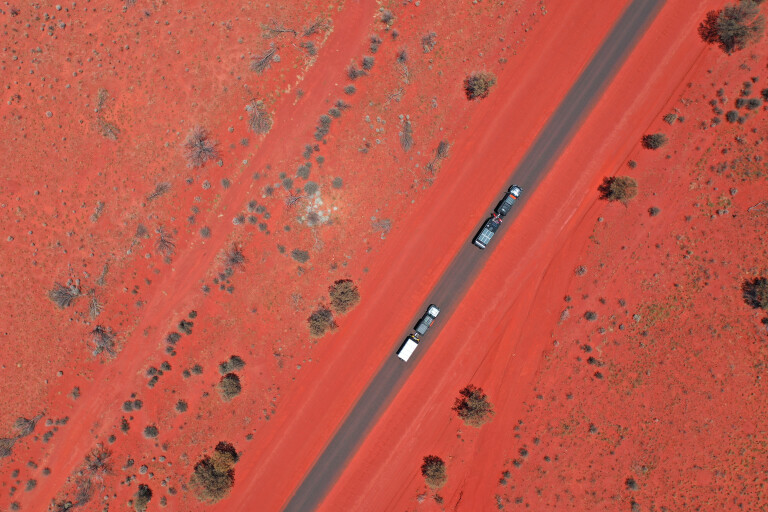
We knew if something happened to one of the vehicles or vans or heaven forbid, one of us, we have double the equipment and manpower to deal with it. Thankfully the trip was uneventful and travelling with another likeminded family made it so much more enjoyable.
Our first day of driving was Toowoomba to Bollon, a total of 481km and around six hours with stops. It was only the beginning but we were ready for a camp that night and found a beautiful waterhole with a well-maintained campsite along the Wallam Creek.
This is a free campground with a flushing toilet maintained by the locals. Let this be an opportunity for me to say how welcoming the locals in all the small outback towns of both Western Qld and SA are. Everyone we met was always so friendly and happy to help out with any local advice.
The next day was our longest driving day in kilometres travelling from Bollon to the Dig Tree near the Qld/SA border. The farther we drove, the redder the dirt became, the less trees we saw and the higher the thermometer rose! Along the way, around 200km from the nearest town, we came across a family running low on fuel that had travelled up through SA.
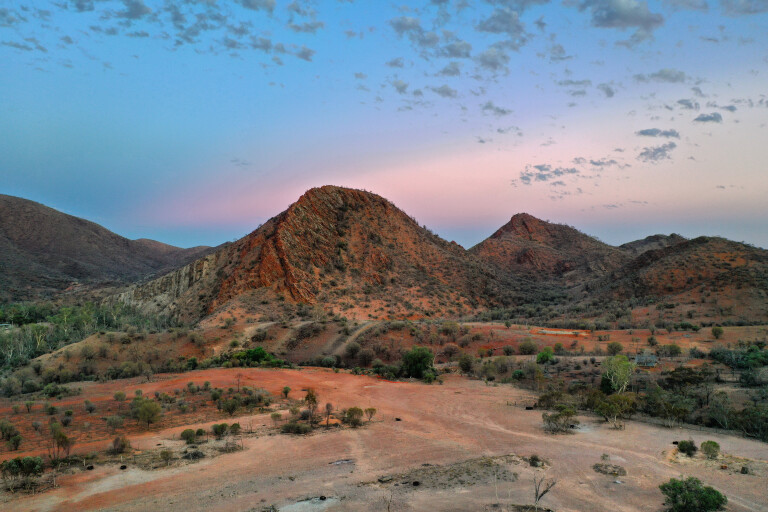
After checking they had enough food and water, we pointed them in the direction of a nearby mine site that may have some unleaded as we weren’t carrying this. This is a good reminder to plan ahead and take plenty of supplies and extra fuel. When talking to the locals, they said they come across this too often and many people get stranded in the great outback.
Arriving at camp around 6pm, we were all ready for a dip in the Cooper Creek and camped at the Dig Tree campground. This is definitely a bucket-list item, just to say you’ve done it and we learnt some modern Australian history.
Situated on the Nappa Merrie Station in Qld, the Dig Tree has been well looked after and preserved and tells a story of the early explorers. Brahe, Burke and Wills the most famous of them and who in 1861, set up camp at the Dig Tree for four months. There is an abundance of information around both the Dig Tree and Nappa Merrie Station at the site and was a good reminder for our iPad-savvy Bella of how far we have come and how lucky we are to have the modern conveniences we do.
Escaping the flies and heat, we set off reasonably early on our third day of travel heading for the border and beyond. Stopping in at Innamincka for a cold beer at 10am(!) and a look around, again we were greeted with welcoming hospitality, before hitting the Strzelecki Track through outback SA.
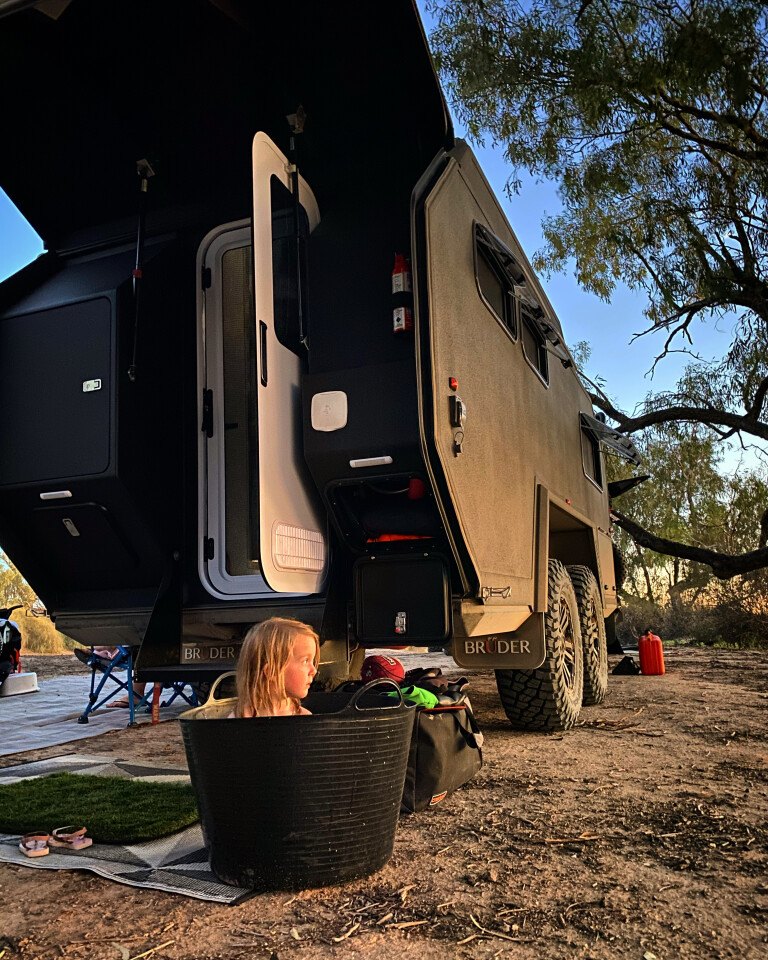
It seems we have learnt the ‘Strez’ ain’t what it used to be! It is now well-maintained with many mining trucks traversing it daily. However, it is still not to be taken lightly as there are patches of corrugations and bull dust, and forever-changing road and weather conditions. With patchy to no reception, it is beneficial to have plenty of fuel, supplies and a two-way on channel 40 to keep in the loop with the truckies.
After a quick lunch stop literally in the middle of nowhere, we then cut off the Strez on to a track towards Arkaroola village. This was much slower going as it was rougher, but we still managed to do around 80km/h. This is definitely one road to check conditions and previous weather on, as we saw evidence of people getting stuck in the mud.
Arkaroola, nestled in the northern Flinders Ranges, is a great little campground complete with fuel bowsers, restaurant, astronomy observatory, rock wallaby feeding and a swimming pool.
On our final day of travel, we were looking forward to the black top and hit the highway bound for the Eyre Peninsula. This was a great drive around the Flinders Ranges and we plan on getting back to explore it one of these days. So, as you can tell, the Strez was only a small part of our trip from shore to shore, and we are so glad we went through the middle of Australia to tick it off the bucket list and teach our kids about outback Australia.
A big thanks to Josh, Ellen, Will and Tom from @79series for being great travel buddies. Now onto the Eyre Peninsula and all that SA has to offer.
Part 4: Bruder EXP-6 caravan
WHILE on the road, we get asked multiple times a week about our Bruder van, and besides “How much does it cost?” the most popular question we get is “Why did you choose the Bruder?”
Can we just say we believe there is no such thing as the ultimate set-up? Everyone is different, everyone has different needs, wants and budgets. It blows our mind the amount of different camping options available and we have had the privilege of meeting many families on the road with such a variety of set-ups.
As most people do, we underwent the evolution of camping and started out in a double swag in our late teens and twenties when we had not a care in the world and I must say, it is a lot easier this way.
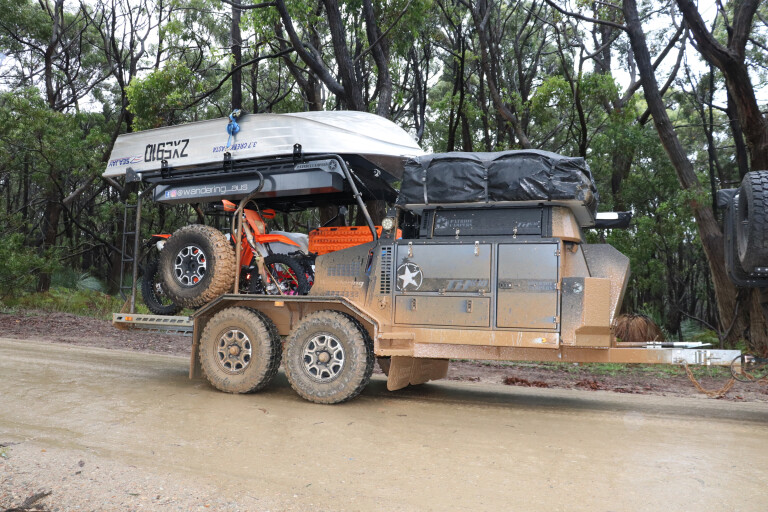
When our first little munchkin arrived, we upgraded to a canvas tent which suited us just fine to camp with. It was after the arrival of our second that we decided we needed something bigger and we found Patriot Campers on the Gold Coast was exactly what we were looking for.
In November of 2017 we picked up our Patriot Camper TH 610. This was a good compromise giving us a bed and kitchen as well as a large trailer to carry all the toys on our adventures. With the hit of the pandemic and a change in our plans we then decided to change to the Bruder caravan for further comfort and living space. Unfortunately, Brendan had to sacrifice the boat and bikes and hasn’t let me forget it!
The Patriot TH610 Toy Hauler is the ultimate boy’s weekender. It can go anywhere and is rugged and tough. Hands down the best feature of the TH610 is the flat bed tray and boat loader so you can carry the boat, bikes, firewood, ATV or many other toys. The kitchen and living area is equipped with a 50L fridge, Redarc electronics and pantry. We added a kitchen extension on the tray to include a gas cooker and further storage.
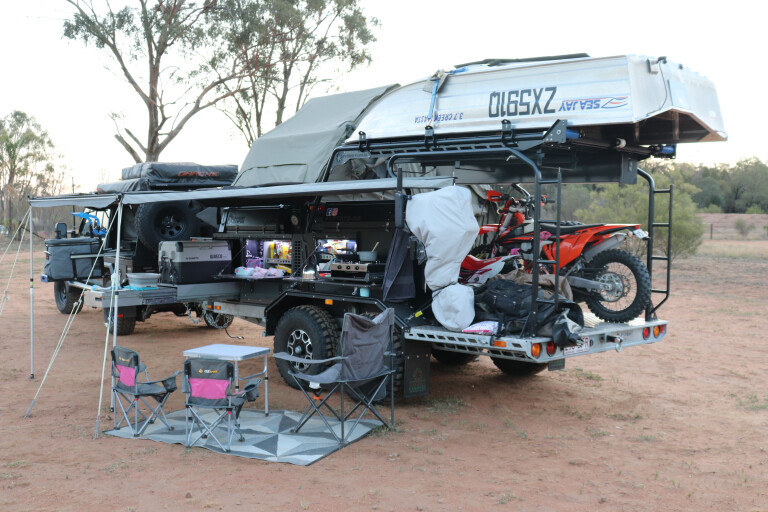
On the other side of the camper, we had a canvas rooftop tent with a queen-size bed and zip-on extra room for the kids. The Patriot had plenty of storage in the hull of the trailer, however given it was a large box space, it needed to be organised and well-packed to easily access what we needed. We loved the outdoor living that our Patriot offered and it was great for a fun-filled weekend away with mates, which seems exactly what Justin had in mind when he designed it.
However, after having our toy hauler for a few years and with our lap of Australia being interrupted by a pandemic, we decided to change things up a bit. We wanted less set-up as we were living full-time on the road and Nikita wanted a few more creature comforts with an indoor toilet and shower. Brendan had already fallen in love with the Bruder and after a quick tour in person we signed on the dotted line.
The Bruder is an off-road caravan with go-anywhere capabilities. The standout for Bruder is the suspension and all-in-one electronic Garmin system. It is cleverly designed and nothing has been forgotten. With a crazy amount of storage, we had no problem fitting everything we need for a year although I must say after three months on the road, we have already sent two parcels home of stuff we ‘thought we would need’!
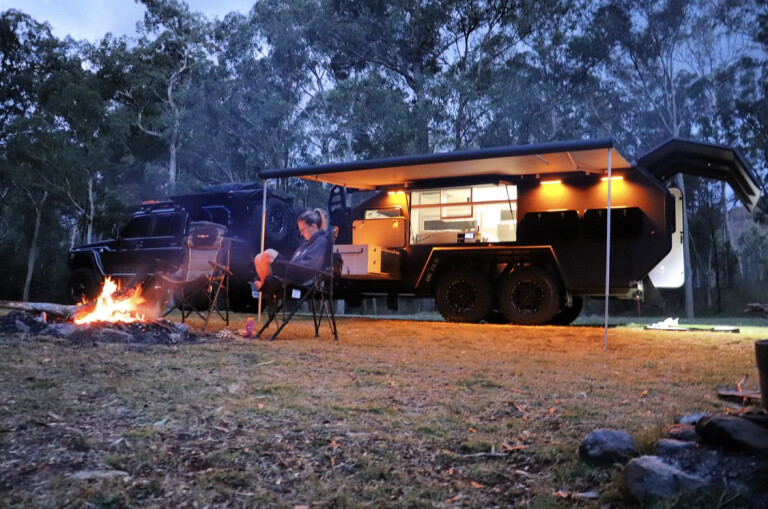
Bruder is luxury-plus but maintains the ruggedness of an off-road van. However, if you are looking for an expansive indoor living space this is not the van for you as it sacrifices indoor space for a compact off-road rig. We love living outdoors and the indoor-outdoor two-way kitchen suits us perfectly.
As any traveller will agree, what you tow all depends on your vehicle, weight capabilities, where you want to travel to and what you want to do with it. We maintain that no van, camper, tent or travelling set-up is perfect and what suits one person will not suit another.
No matter the cost, the most important thing is getting out there with family and friends and enjoying everything this wonderful country has to offer. Travelling life is all about experiencing the wonders of nature, meeting likeminded great people and having the experience of a lifetime whether it be for a night, a year or more.
Part 5: Great Southern Eyre
The tail end of our summer this year was spent discovering South Australia’s gorgeous Eyre Peninsula. Spanning from Spencer Gulf in the east to the Great Australian Bight in the west, with the Gawler Ranges forming the northern border, make for pretty specky scenery.
The eastern side of the triangle that is the Eyre is dotted with many little seaside towns, all unique in their own right. A favourite of ours along here was Tumby Bay. It is most famous for its mural and silo art. We spent a glorious morning strolling around town admiring the various murals, each with their own meaning, and the silo art on the edge of town beautifully represents the small-town culture along the Eyre Peninsula.
Down at the tip of the Eyre, Port Lincoln not only provides an opportunity to top-up on supplies and services but is also a gateway to the unspoiled beauty where the Spencer Gulf meets the Southern Ocean. We stayed a week at Engine Point in Lincoln National Park and were so spoilt with unreal weather and relaxing beach days. Most of the national park is accessible for 2WDs and large ’vans, and there’s plenty of low-cost camping on this great stretch of coastline.
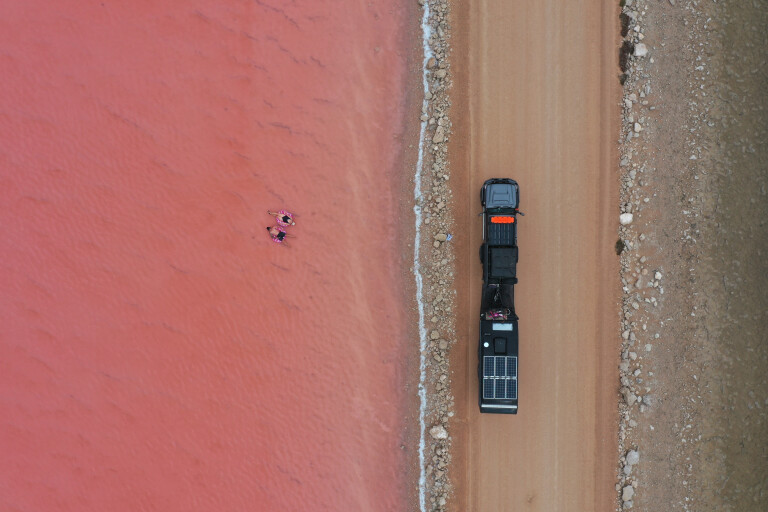
We took a day trip to Memory Cove, where the crystal-clear water and stunning beach was well-worth the work to get here. In order to access the gated Memory Cove, you need to get a key from the Port Lincoln Visitor Information Centre, 20 kilometres from the national park, which you hire for 24 hours with a $50 deposit.
The road into Memory Cove isn’t challenging, but it’s very rocky and therefore a slow trip that definitely requires 4WD. It took us around two hours one way and, whilst we did a day trip without the ’van, you are able to camp there; although, the sites are only suitable for tents and small camper trailers.
After Lincoln National Park, we headed to Whaler’s Way for a slightly different experience. Whaler’s Way, at the very bottom of the Eyre and around 45km from Port Lincoln, is a privately owned property offering clifftop camping and untouched coastline. Unlike the national park, Whaler’s Way has been largely uninterrupted with slightly terrifying cliff edges, beautiful natural caves and plenty of wildlife. Brendan and Bella climbed down the cliffs at sunrise and sat with a colony of seals just doing their thing in the wild. We had a great couple of nights exploring the bottom of the Eyre.
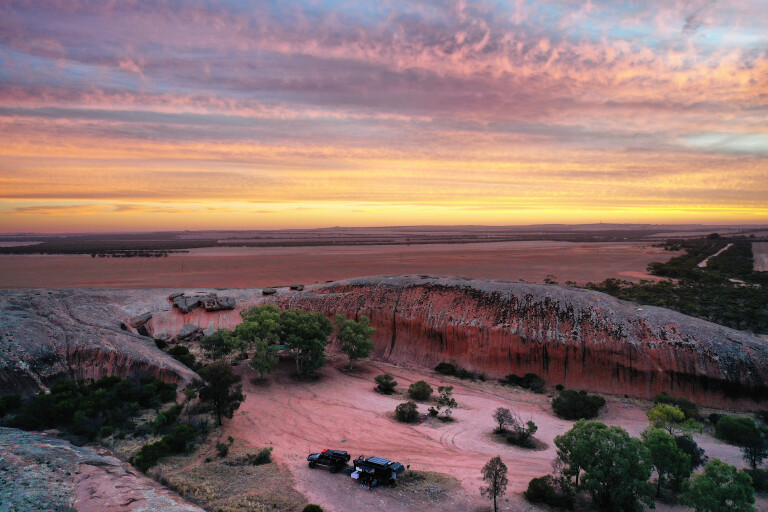
Most famous for its oysters, Coffin Bay on the southwest Eyre was different to what we expected. It’s a quaint, sleepy little town with not much more than a caravan park, IGA and many, many oyster farms. We spent Australia Day exploring Coffin Bay National Park which, we argue, is even better scenery than Lincoln National Park.
There are spectacular lookouts accessible by 2WD and great sand tracks to explore by 4WD. Pull up anywhere along the beach to enjoy fishing, swimming, fresh oysters and a beer or three!
The beaches just get better and better as you travel up the west coast of the Eyre Peninsula. You can choose any number of free beach camp spots to stay at. One of our favourites was Greenly Beach just above Coffin Bay, where we had the whole place to ourselves and the serenity was divine.
Moving up the coast, Streaky Bay is a good stopover for supplies and to base yourself to explore the surrounding area. We highly recommend Tahlia (Woolshed) caves and the Tub, offering natural beauty easily accessible by 2WD – plus there are timber walkways and stairs to explore.
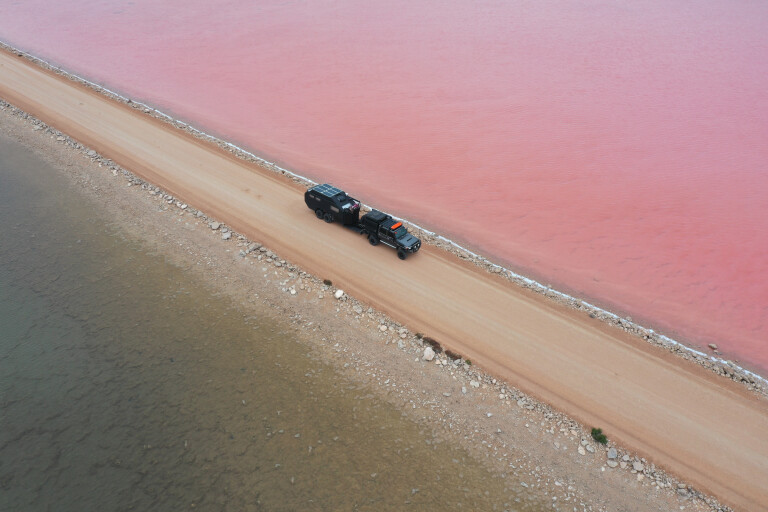
While we didn’t visit too much along the inland route of the Eyre, we did check out the small town of Kimba, known for its amazing silo art and for being the mid-point across Australia. After getting the compulsory photo with the halfway sign, we headed out to Pildappa Rock – very similar to Wave Rock in WA but much less commercialised and a peaceful little camp. There are no facilities here, but there is a great rock formation you can climb and walk all over for awesome sunset views of the surrounding farmland.
One of the final destinations for many at the north-western Eyre Peninsula is Perlubie Beach. This is a fantastic beach camp with flushing toilets and great, little thatched beach huts free for use. This becomes the ‘party beach’ most of the time, and we had a fantastic couple of days partying with many other travelling families. This was also where we were introduced to razorfish, and there were blue swimmer crabs aplenty!
Once the rain set in, we headed for Ceduna before hitting up the Nullarbor which we can tell you all about next month.
Until then, Go Wander!
Part 6: Nullarbor, Goldfields and magical beaches
The Nullarbor Plain – around 1000 kilometres of ... not much really, but it’s definitely a tick-it-off item. We headed west, bound for our largest state earlier this year and, besides the Gibb River Road, the Nullarbor is probably the most iconic way to get to Western Australia.
Before hitting this mighty stretch, we enjoyed the most western parts of South Australia which included Scott’s Beach at Fowlers Bay and Bunda Cliffs, where we spent a night stopover at each. Bunda Cliffs are breathtaking, forming part of the Great Australian Bight and providing us with a spectacular sunset. Following these coastline cliffs, there are many lookouts, caves and points of interest to check out.
We hit the road bright and early bound for WA the following day, with only an hours’ drive to Border Village, where there are plenty of facilities available.
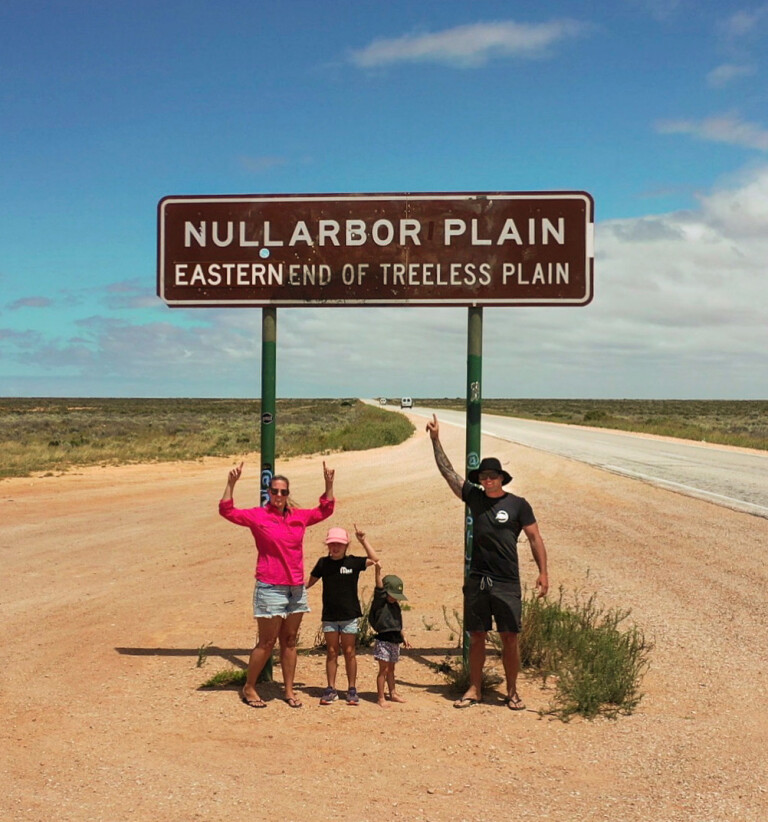
The police on the border were more impressed with our set-up than our border passes, and we were so excited to get through the tightest COVID border control in the country, we forgot to take a pic at the SA-WA border sign! The Nullarbor, to be honest, is not the most exciting drive and, despite there being multiple signs saying watch out for camels, roos and emus, we didn’t see a single one. We stopped for lunch at the Nullarbor Roadhouse and it’s a must-see, providing plenty of photo opportunities. It is another great roadhouse fully set up with accommodation, food and facilities.
After a full days driving including on the famous 90 Mile Straight, our first night in WA was spent at Balladonia Roadhouse. It was a great little set-up with caravan park, pool, restaurant and service station, as well as plenty of flies! We were thinking about doing the Balladonia Track down to Esperance, but after chatting to the locals we were advised it was closed and it was looking like it was going to rain, so we decided against it.
The Nullarbor comes to an end at the small town of Norseman, where it’s either bush or beach and you can head south to Esperance or north to Kalgoorlie.
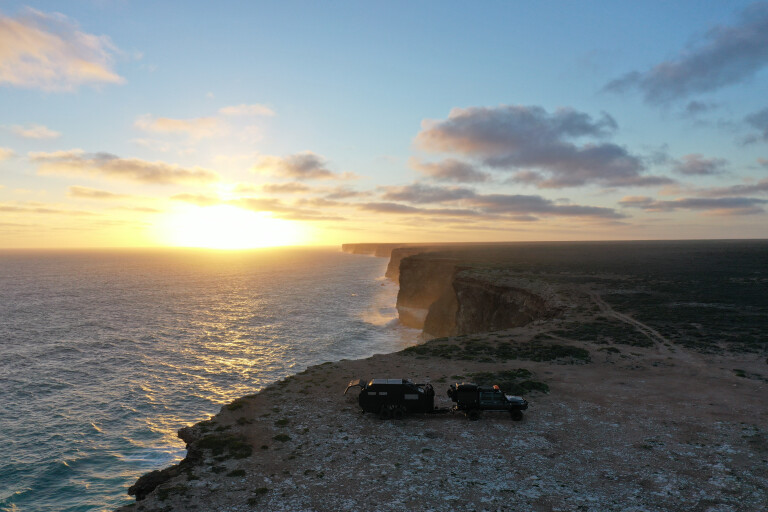
Another great experience in Kalgoorlie is the ‘Super Pit’ working gold mine, where you can go on a tour (when they’re open and operating), go to the mine lookout and watch the mine in action, and witness a blast if they happen to be scheduled. The museum is also well-worth checking out and has plenty of activities for the kids.
In search of the ocean again, we headed four hours south to Esperance. We really loved Esperance and ended up spending well over two weeks there. You could write an entire article talking about the Esperance area, there is so much beach to explore and the 4WD tracks and camp spots around here are endless. In town, there is the port to visit, plus whale watching and Woody Island tours, fishing charters, Lucky Bay Brewing, and much more.
Out of town the most famous beach is Lucky Bay, and we know why it is famous – it is magical! With the most crystal-clear turquoise water and beautiful clean beaches, we lazed for hours on this beach and could even get a real coffee from the coffee cart.
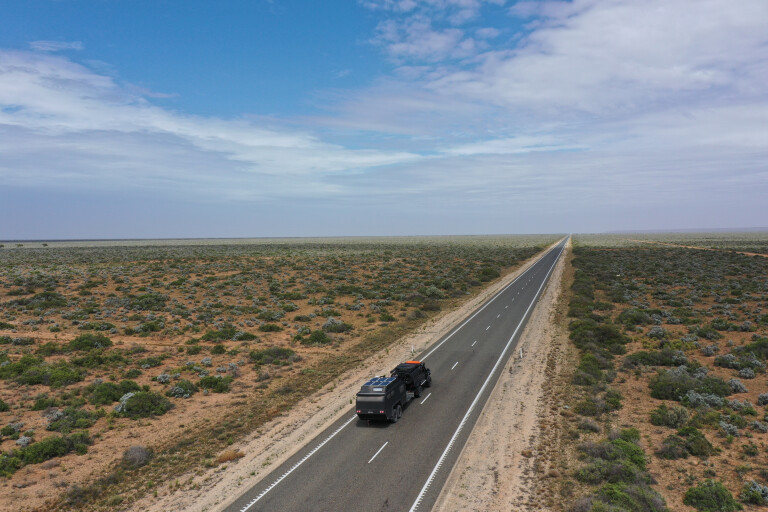
Given the not-so-nice weather forecast, we decided to check out Kalgoorlie first. It’s a decent-size mining town rich in history and we spent a good week here exploring. The historic gold mine is a great morning out and both us adults and the kids learned so much about the boom days of the late 19th century. Spend hours exploring the historic settlement with all the essential elements of an olden-day mining town including miners’ shanties, hospital, post office, pub and a two-up shed.
However, Wharton Beach was our favourite, being even more stunning and less busy. We spent 11 days camping at Membinup which, like every other beach around here, was perfect. The only downside was the wind, which came up most afternoons.
From here we explored all the 4WD tracks around, went for a pub lunch at the old-school Condingup Tavern and visited Le Grande National Park. Esperance and the southwest have just so much to offer we can’t cover it all. Our journey across the southwest continued and we can tell you all about this next time.
Until then, Go Wander …
Part 7: The Great South-West
We visited the southwest corner of Australia back in March, and what a beautiful part of the world this is, but we feel we didn’t spend enough time there and will definitely be back. The following two weeks, after leaving Esperance, we visited so many cool spots such as Albany, Cosy Corner, Denmark, Pemberton and Augusta, all of which we’ll have to tell you about later as there’s so much to see and do in this area.
This month, we want to talk more about the Margaret River region. This was our last stop before Perth and we soon realised it is such a small part of a much bigger wine region. There are so many little towns around Margaret River, each unique in character and most of them ending in ‘up’ meaning ‘place of’ in Aboriginal Noongar language.
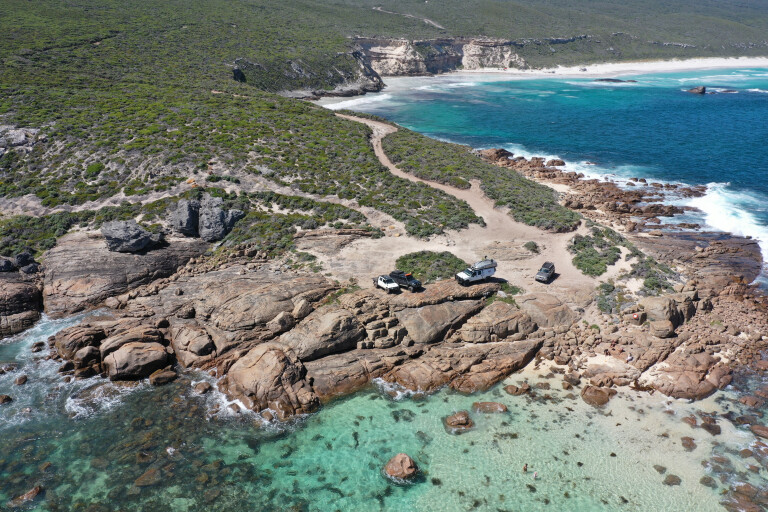
We camped at the Big Valley Campsite farm stay and it was a great place to base ourselves for our five-day Margaret River visit. When visiting Margs, you have to get used to driving everywhere, which never goes well with multiple wineries and breweries – I guess that’s why they invented tours! Everything is about a 20- to 30-minute drive away and, we have to admit, it did feel like we were always on the go and driving here, there and everywhere.
However, the Margaret River region caters for so many different interests. We spent a day exploring the coastline, doing some mad four-wheel driving on beach tracks with some 4WD mates, and were lucky enough to find North Point at the northern end of Hamelin Bay beach. This is a gorgeous, secluded natural rock pool and we spent hours swimming, sunbaking and cruising around the rocks. It was much quieter than the touristy natural spa and Margaret River main beach.
Hamelin Bay is another awesome beach spot, where there are resident stingrays that will cruise up and down the beach and seem to enjoy all the photography and attention.
Another natural wonder of the Margaret River region are the many caves, only a few of which are accessible. We visited Jewel Cave and it was such an awesome experience, with the girls learning so much about these ancient structures. When you visit, go on a tour with a knowledgeable guide who will tell you all the history and science about the cave. You can buy a cave pass to give you access to visit other caves, but we decided one cave was enough for us. From here, head into Margaret River along Caves Road, where most of the caves lie. Plus, there’s a pretty drive through the rainforest.
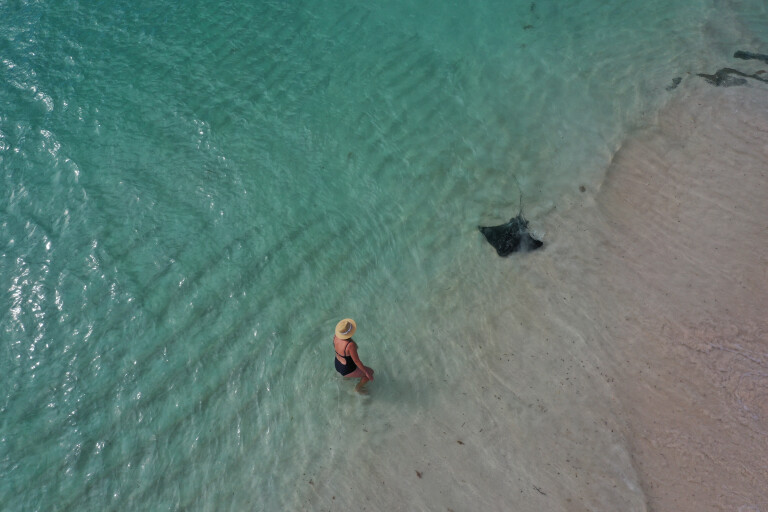
On to the wineries and breweries, which is why we were there, right? If you visit them all, your wallet would be the only thing dry, so we just picked a few, mostly the kid-friendly ones, and had a ball. We spent the good part of a Saturday at The Beer Farm for our daughter’s birthday, and it’s a must-see. It has a large selection of its own brews to sample, a great smokehouse restaurant and a huge area where the kids can run around. The day we were there, it had live music and a waterslide for the kids, hence why it was so easy to get to closing time and realise we’d been there all day!
Many of the breweries and some of the wineries have similar set-ups, with playgrounds for the kids and amazing food to accompany the amazing wines. Margaret River region is definitely a foodie’s paradise and we came away a couple kilos heavier and a few hundred dollars poorer.
Heading north, we arrived at Busselton, which was much bigger than expected and its foreshore precinct is a great place to spend the day. There are some great restaurants overlooking the ocean to have brekkie or lunch, or even take a picnic to let the kids go wild on the largest playground we have ever seen – our girls would have spent hours on the pirate ship playground if we had let them.
The main feature of the foreshore is the famous Busselton Jetty. It is the longest timber jetty in the Southern Hemisphere. You can walk to the end or take the lazy option on the gorgeous, little red electric train. Included in the train ride ticket is entry into the underwater observatory, which is a natural aquarium full of a huge variety of beautiful fish and coral.
As mentioned, there is just so much to see and do in the Margaret River region and there is so much variety – no matter your thing, you will be entertained. However, the two things we didn’t love about Margs was the amount of driving around and how expensive everything was. But that said, the pros definitely outweigh the cons and it is such a magical part of Western Australia.
Part 8: Dirk Hartog Island
Well, where do we begin? We absolutely loved our time on Dirk Hartog Island (DHI). It was a nice escape with back-to-basics camping and time well-spent as a family. We had five days on this western slice of paradise and enjoyed the laid-back island life and natural beauty of this place.
Dirk Hartog Island is a World Heritage site situated off Steep Point, the westernmost point of Australia, in the Gascoyne region of Western Australia. At 80km from end to end and 620km² in area, it’s WA’s largest island, and it’s only a short single-car barge ride from Steep Point. DHI is part national park and part privately owned by the Wardle family, who have owned the property since the early 1960s.
Let us take you on our mini-trip of DHI and, trust us, you’ll want to make the journey for yourself!
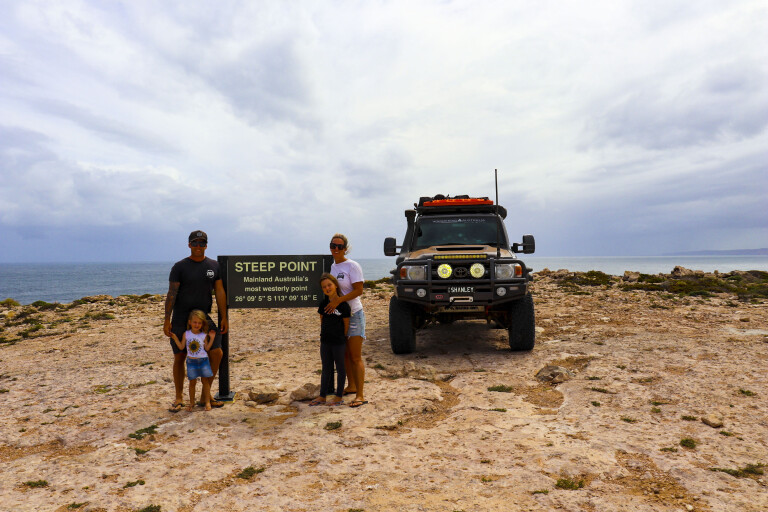
STEEP POINT - DAY 1
Getting to DHI is a small mission in itself, with the barge leaving from Steep Point, which is a three-hour four-wheel drive from the Shark Bay turnoff to get to. We left our ’van at Hamelin Station Stay as it was just a metre too long for the barge and headed towards Shark Bay, turning off towards Edel Land National Park. We didn’t think the road to Steep Point was too bad, but it is quite corrugated with a few short, soft spots. The road is unsealed and requires reduced tyre pressure, and be sure to check road conditions before heading off. It’s not a challenging drive, but it gets a bit arduous with three hours of jiggling.
Steep Point is well worth the effort though, with rugged cliffs on one side and beautiful beaches on the other, much the same as DHI. We visited the famous sign and explored the point, then settled in for our first sunset at Shelter Bay. Once you book a trip to Dirk Hartog Island you must then contact the ranger station at Steep Point, as they have campsites reserved for DHI guests at Shelter Bay – another stunning WA beach camp off the beaten track!
DIRK - DAY 2
We were so excited for the island we were up at sunrise ready for the barge ride. With only one car at a time fitting on the barge, it is a bit of a wait in line, but we got over there eventually and started exploring. Our first stop was Surf Point, which is such a cool little place full of baby wildlife including turtles, shovelnose sharks, many other sharks, and plenty of fish. We weren’t game enough to get in with them, but it was still amazing to watch from the shore.
We then explored the bottom part of the western side of the island. We were truly blown away (excuse the pun) at the blowholes, and these were the best blowholes we have seen so far. The sound of the waves and air shooting up through the rock was phenomenal. We ended the day at the homestead campground with basic facilities available, but best of all was the well-stocked bar where we enjoyed a few cold bevvies before hitting the RTT for the night.
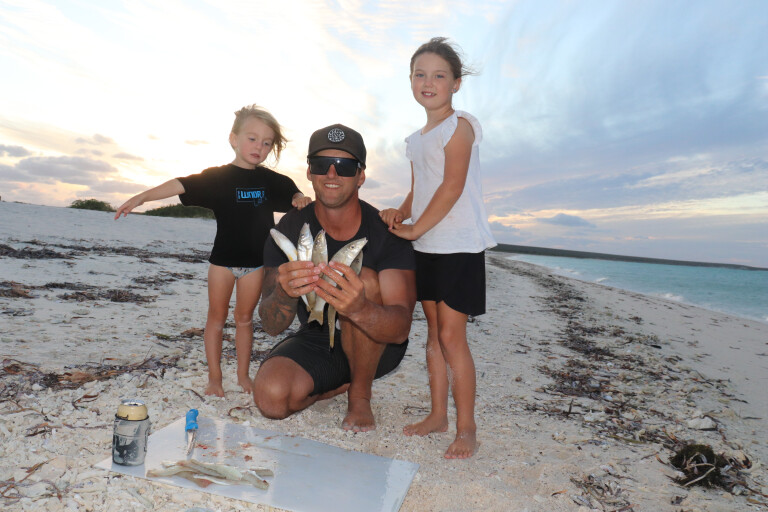
SANDY POINT - DAY 3
We headed north to explore the east side of the island which is dotted with pristine beaches, most of which you can camp at. While the island is only 80km long, it took us a good three hours (excluding stops) to get to the top. Notch Point was a magical little secluded spot where we didn’t see a soul and went for beach strolls and explored the little caves. We stopped for a late lunch at Louisa Bay, threw the lines in for a ‘quick fish’ and ended up catching a big feed of whiting for dinner. Yummo!
Hopping from beach to beach, we spent the afternoon and night at my favourite part of the island, Sandy Point, where we didn’t see anyone the whole time we were there. This was one of the best days of our trip as we just fished, played and chilled the day away as a family of four, spending quality time with each other.
CAPE INSCRIPTION - DAY 4
We headed for the top, stopping in at Withnell Point for a quick look. You can camp right down on the beach at Withnell and it is a popular family camping spot. We also checked out Dampier’s Landing – the site where William Dampier landed in 1699 – which hosts yet another beautiful beach and single campsite behind the dunes.
We headed farther north to the tip at Cape Inscription, to explore the lighthouse and memorial to DHI’s discovery in 1616 by Dutchman Dirk Hartog. This was also the first recorded landing by Europeans on Australian soil. Most of our time at the tip was spent at Turtle Bay, where the outlook and landscape are just magical!
We enjoyed a spectacular sunset from our clifftop camp, then snuck down to the beach late at night looking for hatching or laying turtles, but unfortunately we lucked out and just found the shell remnants from hatchings. Turtle Bay is one of the best camps on the island, but beware the crazy number of mozzies.
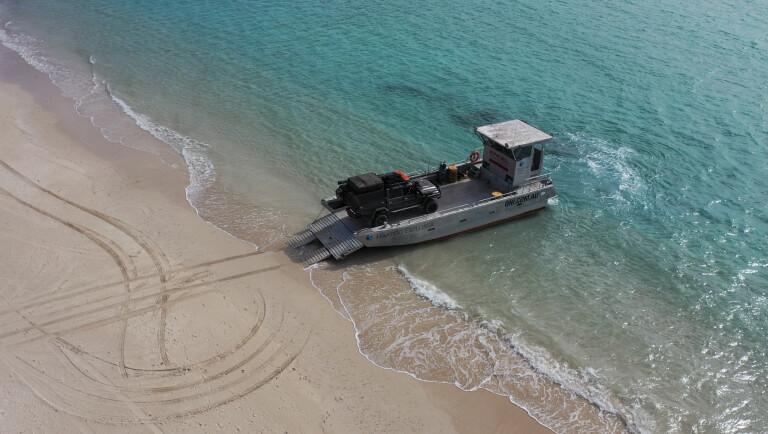
MAKING OUR WAY BACK - DAY 5
We woke up at Turtle Bay on our last full day on DHI and unfortunately the weather decided to turn on us and the rain had set in. We checked out the northwest side of the island with its huge waves crashing against the cliffs. There are also a few camp spots, some with shelters and toilets, on this side of the island which would be ideal for adrenaline-junkie cliff fisherman. Through the rain, we headed back to the homestead, where we just chilled out in the RTT for the afternoon.
The following morning, we hit the barge early and headed for home back across the Steep Point Road that had just been graded and was a nice surprise. It was one of the best weeks of our trip and we highly recommend Dirk Hartog Island. This trip requires some planning, 4WD and camping knowledge, and a sense of adventure!
Part 9: Ningaloo Coastline
It’s up there with being our number one travel destination on our trip so far. Western Australia’s stunning Ningaloo Reef and Gascoyne Coast is breathtakingly beautiful. And with the Ningaloo Coastline stretching 300km, there is a little bit of something for everyone from spearfishing and boating to four-wheel driving to great dining and shopping. However, Ningaloo is very much seasonal and as busy as it is, we feel you really have to brave the crowds and visit in peak season to get the most out of the area.
We spent around a month exploring the Ningaloo Marine Park, travelling north from Coral Bay, around Cape Range National Park and Exmouth, and inland towards the Pilbara. Ningaloo Station on the southern side of Exmouth is the ultimate in beach camping with beautifully clean white sand and that magic blue water it is famous for!
We based ourselves at Winderabandi Point for a week and explored from there. In all, there are five beach camping areas to choose from, with Winderabandi and South Lefroy the pick of those. There is fabulous snorkelling at South Lefroy, where Bella spent hours swimming with turtles, reef sharks and so many fish! We did all the things we love – snorkelling, swimming, exploring, fishing and beach lazing at Ningaloo Station.
A couple of pointers though – the road is very corrugated, rough sand tracks, there is no phone reception and there are no facilities, so you have to be fully self-sufficient.
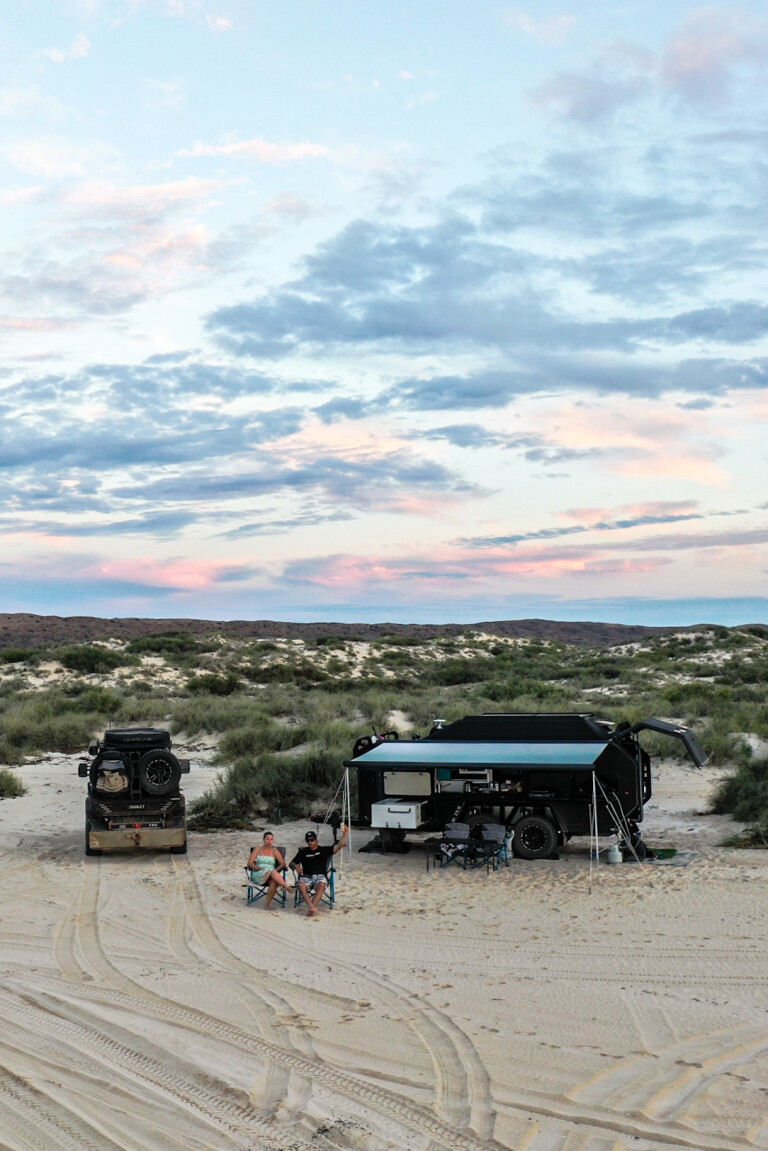
Heading north, we tackled Yardie Creek water crossing on low tide, into Cape Range National Park where that gorgeous reef just gets better and better. The national park’s campgrounds are more marked out, offer facilities and are 2WD accessible from Exmouth making it very busy in peak season.
All the campgrounds in Cape Range are unique in their own way. Again, we did some amazing snorkelling at Osprey Bay, Turquoise Bay and Oyster Stacks where you can walk the beach and then let the current take you along the reef. Unfortunately, despite my best efforts, I missed out on swimming with a turtle but it was a magic experience all the same.
From Cape Range, we ticked another bucket-list item off when we swam with whale sharks. This is something we had wanted to do for some time and it was beyond all expectations. Swimming alongside these beautiful creatures literally took the breath away. We spent a full day out on the boat with 3 Islands Whale Shark Dive and highly recommend these guys. The team couldn’t do enough for us, loved what they did and were also great with the kids. We had six dives total and couldn’t get enough of these majestic animals. It was worth every dollar and would do it again in a heartbeat.
The town of Exmouth reminded us of a quieter Byron Bay and it is the one place we could see ourselves living in. Exmouth exudes a young eclectic vibe and has great boutique shopping and dining – I think we tried just about every dining venue in town.
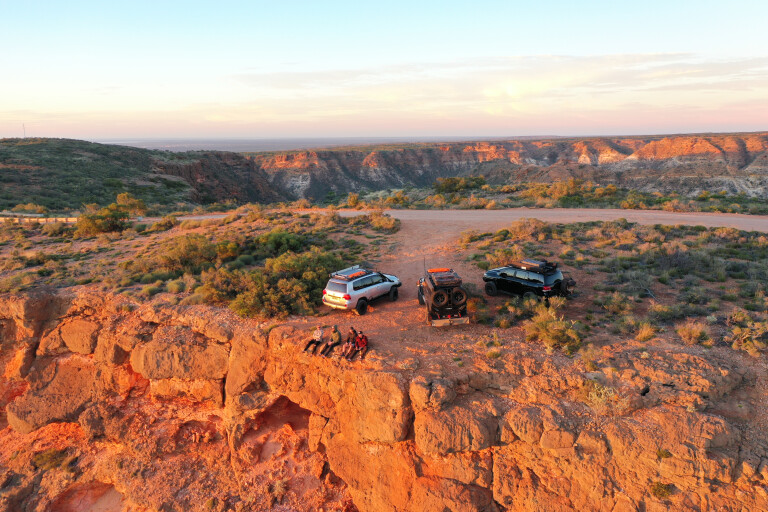
There’s also heaps to explore around Exmouth with the Vlamingh Head Lighthouse precinct and SS Mildura shipwreck providing good history lessons, Charles Knife Gorge and Shothole Canyon for 4WDing and natural scenery, and the many beaches for fishing and swimming.
Also worth a visit is the Ningaloo Centre in town – again it has something for everyone with the history of Exmouth, particularly the American influence and occupancy, and the Ningaloo aquarium and reptile display which the girls loved. As we say with most places we visit, we could have spent so much more time in the Ningaloo region and really ‘felt at home’ there. But we just couldn’t be that far away from family and had so much more exploring to do, so we held off putting that house deposit down.
On our way to the Pilbara, we stopped at my favourite station stay so far – Bullara Station. This is a working sheep and cattle property and offers a great farm experience with all the luxuries of glamping. The best part was the scones they do daily and I was most impressed they had gluten-free scones – win all round! If you can’t already tell we absolutely loved exploring the Gascoyne Region, especially our ocean-lover Bella, we will definitely be back! From beach to bush, well sort of, our adventure on the Gibb River Road is next month.
Part 10: Embracing the Kimberley
From the minute you set a tyre on the dirt of the Gibb River Road, a sense of adventure and excitement fills your soul and doesn’t leave you – this is known by the locals as the Kimberley Spirit. There is just something about the Kimberley that sucks you in and makes you feel like you never want to leave!
We spent a month exploring the north, travelling from Broome to Kununurra, as well as popping down to the Bungle Bungles. With three weeks on the Gibb River Road, we divided our trip into thirds: Derby to Kalumburu Road, Mitchell Falls to Honeymoon Bay, and Gibb River to Wyndham. However, there are many different ways to explore the top of Western Australia, depending on your time frame, budget and set-up.
As most of you know, the Kimberley is famous for its towering gorges and refreshingly clear water that provides an oasis in this often-dry rugged landscape. During our month in the Kimberley we visited 14 of these natural beauties, and in the ‘first third’ of our trip we walked seven gorges in seven days. The gorges all have their own unique character, and a few of our favourites were El Questro, Manning and Bell.
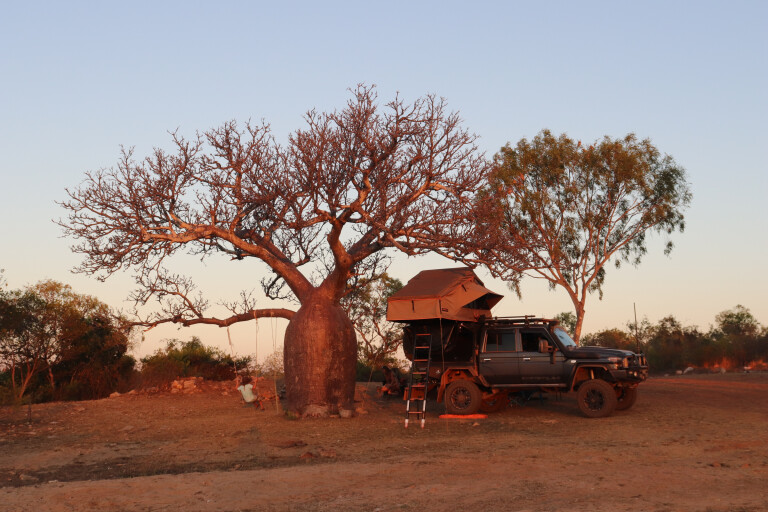
We took most of the gorge walks at around 6 or 7am in order to beat the heat and the crowds. Most of them are around 3 to 4km return, tracking along the pebbly creek line to cool, deep waters for a swim at the end.
Bell Gorge is an easy 1km walk into Bell Falls, where you can relax by the upper pools or venture down to the lower pools beneath the falls. We spent a good few hours lying around in floaties on the water and baking on the rocks in the sun.
Manning Gorge is similar to Bell Gorge (with the swimming) but more spectacular, which makes it much more popular. The walk into Manning Gorge is a bit longer at around 2.5km and starts with a swim across the water, which certainly wakes you up at 6am. The walk after this, along the top of the gorge, is much more arid and doesn’t provide much shade, so best done in the morning or afternoon. It is easy to spend the whole day at Manning Gorge; swimming under the waterfall, jumping off the rocks and lazing in the sun.
Our favourite walk was El Questro Gorge, on the eastern end of the Gibb. This was the most challenging hike (especially with the kids) but definitely the most scenic. It truly is an oasis full of ferns and palms, and copious shade means you can do it any time of day. The walk follows the creek, with the Halfway Pool providing a great rest stop – you must get wet to pass this point. The second half of the hike involves boulder climbing, with a scale along the waterfall sure to get the heart racing. El Questro ends at MacMicking Pool, which is deceptively deep and has a gorgeous waterfall flowing into it. El Questro gorge is simply stunning and unmissable!
FREE CAMPING
When it comes to camping, the options on the Gibb are endless. There are so many free roadside camps for self-sufficient campers, many of which are beside a river or creek. If free camping is not your thing, there are also plenty of farm stays and a few campgrounds with basic facilities. Some highlights include the Gibb River Rest Area, Home Valley Station and the Pentecost River.
The Gibb River Rest Area is 3km north off the Gibb River Road at the Kalumburu Road river crossing. This free camp area doesn’t provide a huge amount of space, but it’s beautiful and peaceful and the kids had a good play (and wash off) in the river. Home Valley Station on the eastern end – complete with a bar, restaurant, swimming pool, playground and green grass – is certainly a treat after three weeks of dirt roads and basic camping. Pentecost River is another free camp with plenty of space, and we tried our hand at barra fishing and croc-spotting, and enjoyed a balmy night by the campfire.
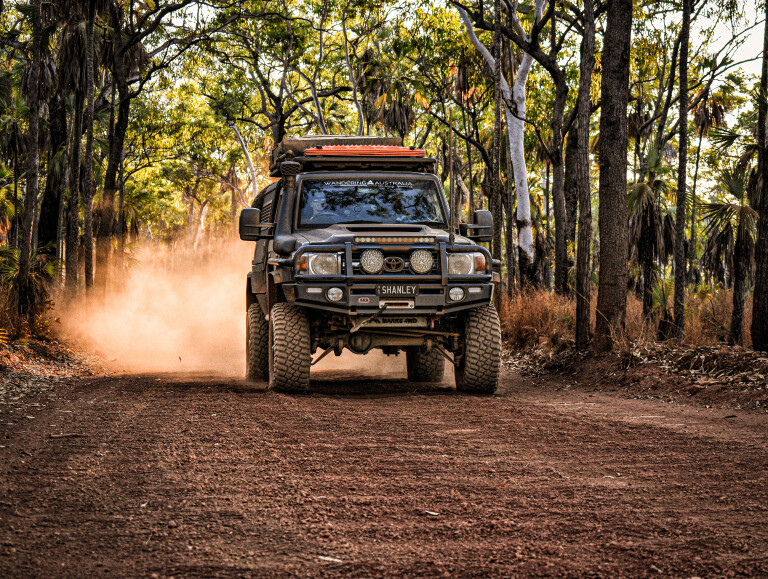
Road conditions and 4WD suitability change on a daily basis in the Kimberley in the dry season, as hordes of people move through it. We saw a fair bit of carnage along the way with flat tyres, bent-up trailers and broken chassis. It is a very unforgiving road, but with the right equipment, knowledge, tyre pressures and time, it is not impossible.
The worst road we experienced was the Mitchell Falls Road, with around four hours return of bone-shaking corrugations. We were warned about the road but it was a bucket-list location for us and we had to check it out for ourselves. There is a lot of hype about the condition of the Gibb River Road, but we didn’t find it too bad and it is certainly worth the drive to see this amazing piece of our country.
The Kimberley’s landscape is harsh and unforgiving, but there is beauty to be found around every corner. We will definitely be back!
Part 11: What a year it has been!
As we wrap up 2021, I want to talk about what we’ve learned travelling around Australia this year, and boy have we learned plenty.
This year has been one of the most rewarding of my life – I made a promise to myself at the start of the year that I would get out of my comfort zone, and I have definitely ticked this box. Our trip around Australia has been everything we expected and much, much more! We have seen the most amazing sights and experienced life-changing moments. Travelling Australia gives you the opportunity to say “yes!” more often than “no!” and when you change to this mindset, the life you live is mind-blowing!
That was a big attitude change for me, and I found myself swimming with whale sharks in 60 metres of the deep blue, standing on mountain summits soaking in the clean air, and conquering rough 4WD tracks to say “we did it!”
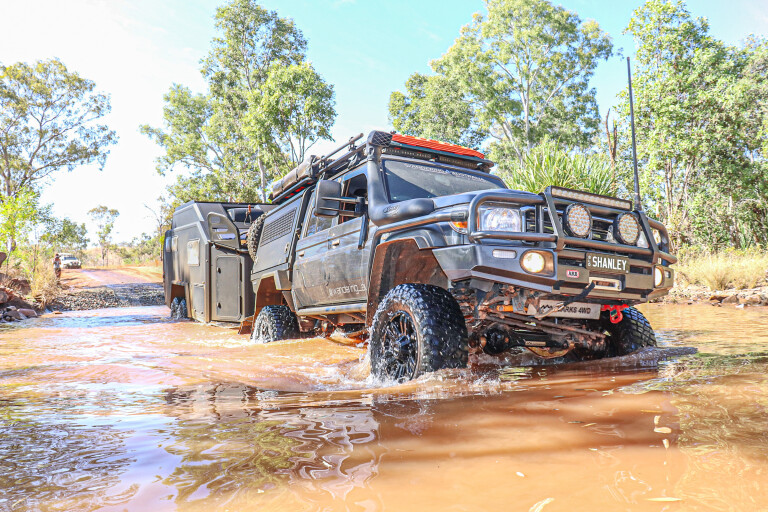
Travel life is just one great moment to the next, but as many travelling families will tell you, it’s not all margaritas and sunshine. You go through this change after about a month, where it begins to feel like a lifestyle rather than just a holiday, and the real world starts to creep back in. While on the road, you still have to do all the everyday things you would at home – grocery shopping, cleaning the house AKA van, educating children and paying bills; and some people are still working on the road, so they have that as well.
On top of this, we are always planning our next adventure, managing bookings, as well as editing photos and videos to keep of our memories. Don’t get me wrong, I am not complaining, but it’s definitely a busier lifestyle than I thought.
We often get asked, “How do the kids go travelling?” And our answer every time is, “They love it.” We feel this experience is one of the biggest life lessons for children, and it has been so rewarding watching our children learn and grow. They have learned things I never could have imagined as a child, such as the many varied species of fish and animals, how to interact with both kids and adults from all walks of life, the beauty of nature, and so much history of both our First Nations and Colonial peoples.
Our kids have really come out of their shells and have become humble, versatile and adventurous little human beings. We educated Bella, our eldest, both in and out of the classroom; and when she was doing conventional schooling, she did it with Longreach School of Distance Education.
While it was a learning curve at the beginning, mainly getting Bella to listen to me and concentrate long enough, we got there in the end and I cannot thank LSODE enough for the wonderful support and teaching they provided us over the last couple of years. We wanted to do a structured school program as I felt I needed the direction and motivation. Formal education is something I highly value and felt it was important for Bella.
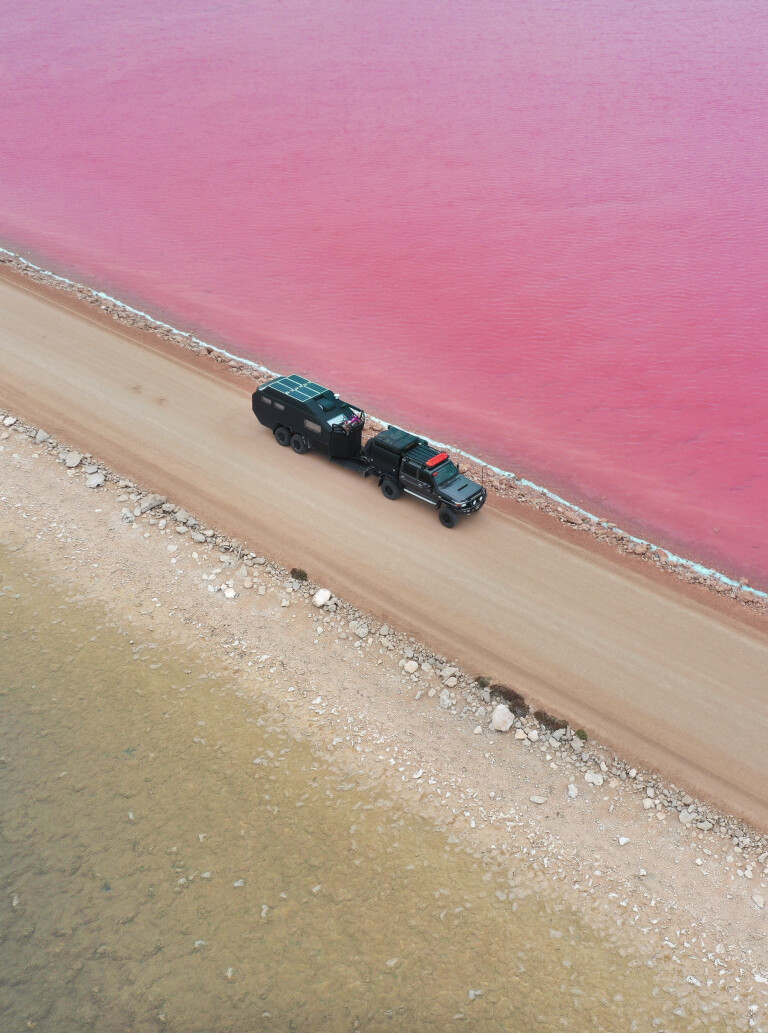
The families we met on the road all do it differently, from unschooling to workbook-based learning to home-schooling to distance education. No way is the right or wrong way, it’s about what is best for your family. It is quite a minefield out there once you start researching. As for Hannah, our youngest, she is our outdoor-loving tomboy and was happy to go exploring with Dad, while Bella and I did some schoolwork.
Another concern people often ask about, and I must admit it did cross my mind, is about our kids missing out on social interaction through school and other activities – and, wow, this is extremely the opposite. Both our kids and Brendan and I have met some amazing, kind and caring people on our travels who will be lifelong friends.
Travel life is very social and you just have to be willing to get out there and say, “G’day, how are you?” … and next thing you know, you’re still up at 1am, a few drinks deep, chatting around the campfire. We just continue to be astounded at how generous people are and how total strangers have welcomed us in to their lives, homes and boats, just because they are great people!
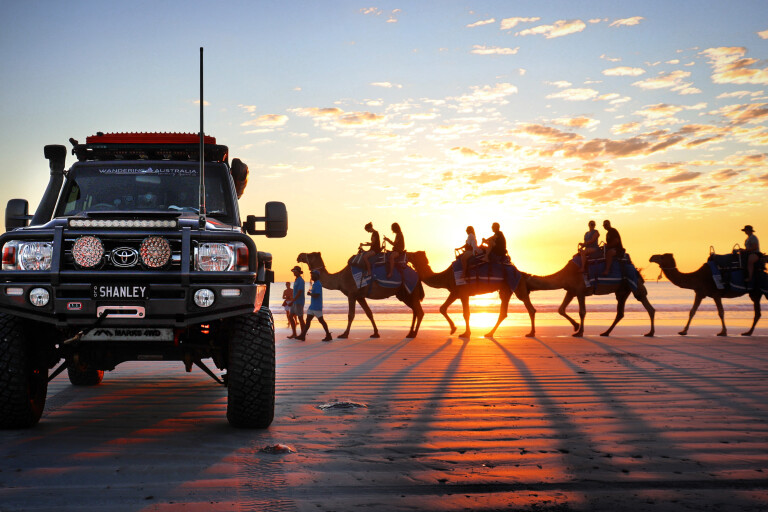
None of this travelling life would be possible without our workhorse, the 79 Series. I’m sure Brendan had some idea about maintenance and running costs involved in travelling Australia in the 79, as, to be honest, I have no idea about any of it. However, even Brendan admits he didn’t realise just how much time, effort and money we would have to put in to the big girl.
We have spent a small $16,000 this year in repairs with regular services, new gearbox, two new tyres, all-new brakes and rotors, new rear diff centre, rear portal axle repairs, rear leaf springs replaced and a few other bits and pieces sorted out. We absolutely love our beast and it’s now practically brand-new mechanically, but it leaves a bitter taste forking out money to fix it.
However, the places it has taken us make the memories priceless. We also want to take this opportunity to say that whether you tour in a $20,000 or $200,000 car, it’s about the experience and getting out there. Be warned, though, you will still need to account for maintenance and repairs in your budget, no matter the vehicle.
There are so many other things we have learned, and maybe I will touch on them in the New Year, but as you have probably gathered, travel life is incredible! If you are considering packing up your life and hitting the road, just do it! It’s the best thing you will ever do. We are looking forward to sharing more adventures with you in 2022. Have a wonderful Christmas and all the very best for the New Year.
Part 12: Karijini National Park
Karijini National Park is an experience like no other and was truly memorable. This spectacular collection of gorges nestled in the Hamersley Range in the Pilbara region of Western Australia provides breathtaking adventure around every corner.
We spent five nights at Karijini but could certainly have spent longer. As we were moving north along the coast of WA, we travelled to Karijini from Exmouth along the North West Coastal Highway and headed in to Tom Price (Karijini’s nearest town) to stock up on supplies. We spent our first night at Tiger Eye Pool, a great little free camp around 20 kilometres west of Tom Price.
In terms of camping at Karijini, Dales campground and Karijini Eco Retreat are available, with online bookings essential for both. Dales campground is run by the Parks and Wildlife Service and is a basic campground with drop toilets only. This campsite is within walking distance of the most accessible gorge walk, the aptly named Dales Gorge, and Fortescue Falls and Fern Pool. Fortescue Falls is magical and you can’t visit Karijini without having a swim in the chilly Fern Pool, where you can sit beneath the waterfall and contemplate life.
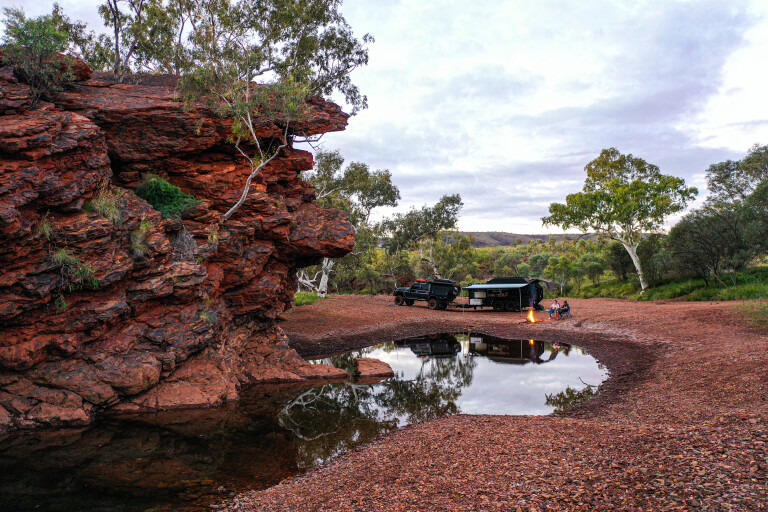
We spent our first full day at Karijini exploring Hancock, Weano and Knox Gorges. This was a big day with around 10 kilometres of walking all up, but it was such an adventure. Just like the Kimberley, each gorge has its own personality, and Hancock was probably our favourite.
This was challenging at times, with some steep ladders and a fair bit of rock-ledge hopping. The first section involves getting down a ladder to walk along the rock ledges at the bottom of the gorge, where you reach a natural amphitheatre around two-thirds of the way along. This is perfect for having a water-and-snack stop and warming up a bit after wading through the icy-cold water.
The end of Hancock Gorge is the slightly challenging bit with a spider walk between the rocks to reach Kermits Pool for another freezing-cold swim. This pool is beautifully fresh, crystal-clear water and you get a real sense of achievement when you make it to the end. Then to start the climb back, with the whole walk taking a few hours including resting and swimming time. We highly recommend reef shoes and a wet pack for this walk.
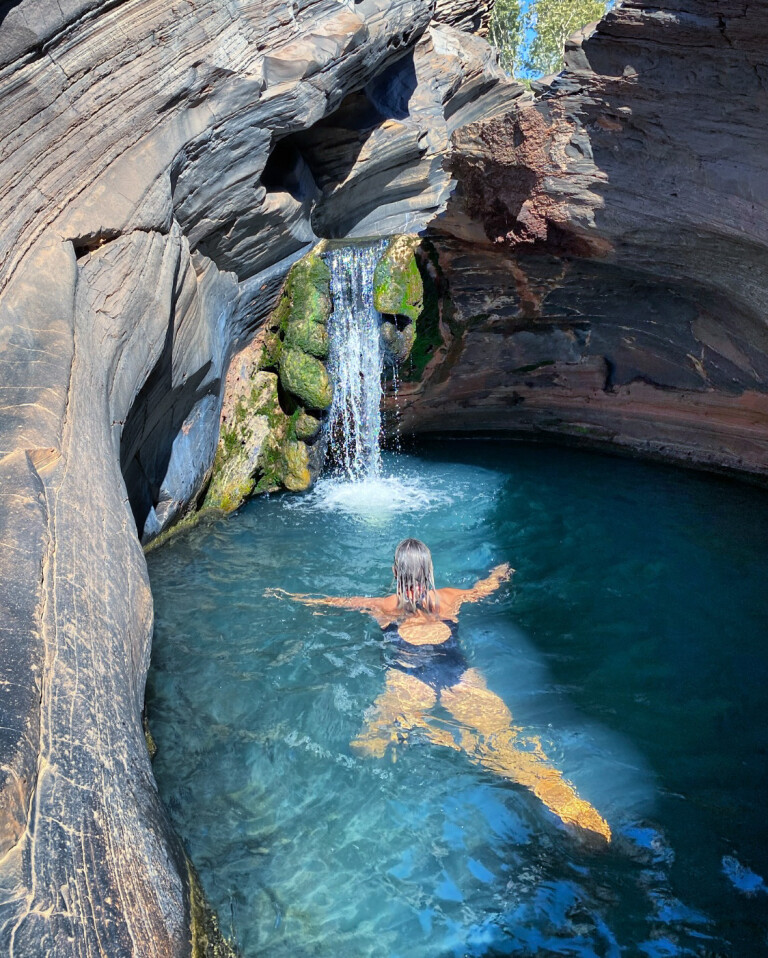
Another one of our favourite gorge walks at Karijini was Hamersley Gorge. This gorge has become a little ‘Instafamous’ for its natural-spa rock pool and we certainly know why. Hitting the road early definitely paid off as we had the place to ourselves for a good hour.
There is a short section of steps to get down to the gorge and, once inside, it is just a matter of scrambling over some rocks to enjoy the gorgeous fresh rock pools and waterfalls. Again, the water was freezing cold and we reckon in summer, it would be so refreshing on a warm day.
This a great gorge to pack a picnic and enjoy the day there, but with the roads the way they are, it takes a good hour to get from Dales campground to Hamersley Gorge − some people visit this gorge on their way in or out of the campground to avoid backtracking.
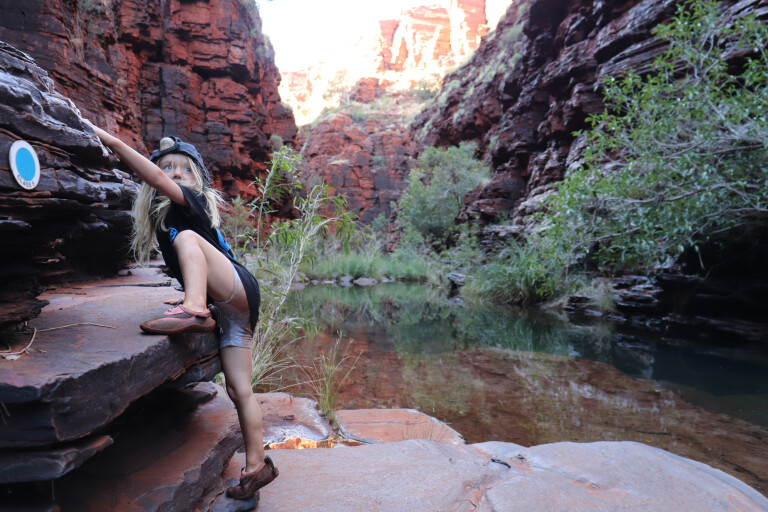
There are many other walks and gorges around Karijini and we didn’t get to see them all, but that’s a good reason to return.
The information centre with its small history museum is a wealth of local knowledge and well-worth a visit upon arriving at Karijini. There is no food, supplies or phone reception at Karijini, so good preparation is key. Another thing to keep in mind is that most of the roads are unsealed with some not wet-weather suitable – and the red dirt gets everywhere!
We left Karijini with stained feet, a red van and ruined clothes, but a great collection of memories. It is definitely a bucket-list item and well-worth the travel in.
Part 13: Bush versus beach
When it comes to travel and camping in Australia, there is that age-old debate: bush versus beach?
On our travels, we have done our fair share of both, but the ocean is always calling us back and if we had to choose, it’s seaside hands down. Both hitting the sand and the great Aussie bush have their pros and cons, and the beauty of an island nation is you can enjoy both.
Having grown up in the country, we spent most of our childhood and early adult life bush camping in Western and Central Queensland. It is the best feeling to leave behind the hustle and bustle of the cities and towns and get back to nature out in the bush, where you feel like the only people in the world and it is just blissfully quiet.
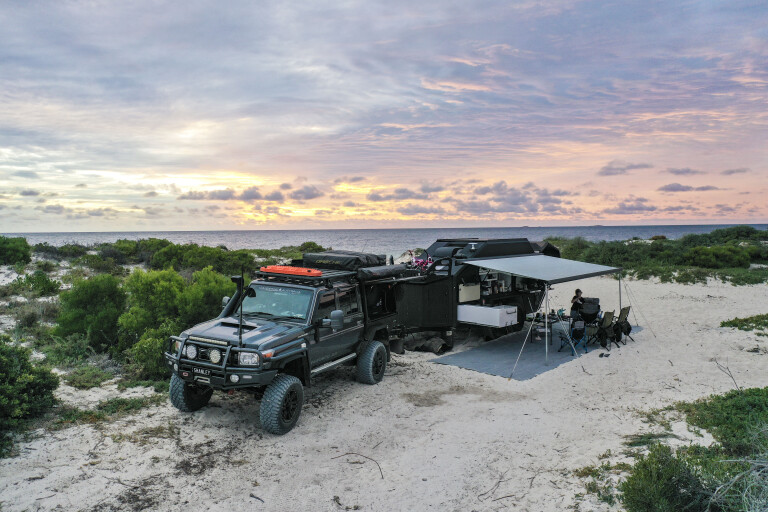
We have spent a few summers water skiing at Lake Boondooma, along the many western rivers and simply just getting out on nearby properties with nothing but a campfire and a blanket of stars.
There are so many inland lakes and dams to enjoy without the worry of sea creatures defending their territory, and away from all the tourists and beachside hotspots. As well as this, there are many mountain ranges to explore inland from the Flinders Ranges, SA, to the MacDonnell Ranges, NT, to Mount Augustus in Western Australia providing outstanding bush-camping getaways. However, we do think camping in the bush is best done in the cooler months when you can enjoy a campfire and it’s not so hot during the day.
We were so privileged to be camping literally in the middle of nowhere when we had a lunar eclipse in the middle of last year and it was one of the best nights of our trip. We had climbed Mount Augustus earlier that day and camped on the side of the road amongst huge cattle farms in the Gascoyne region in the mid-west of WA. I will never forget sitting around a campfire watching the lunar eclipse with no light or noise pollution and thinking how very lucky we are to live in this amazing place. It is memories like this that make bush camping so attractive.
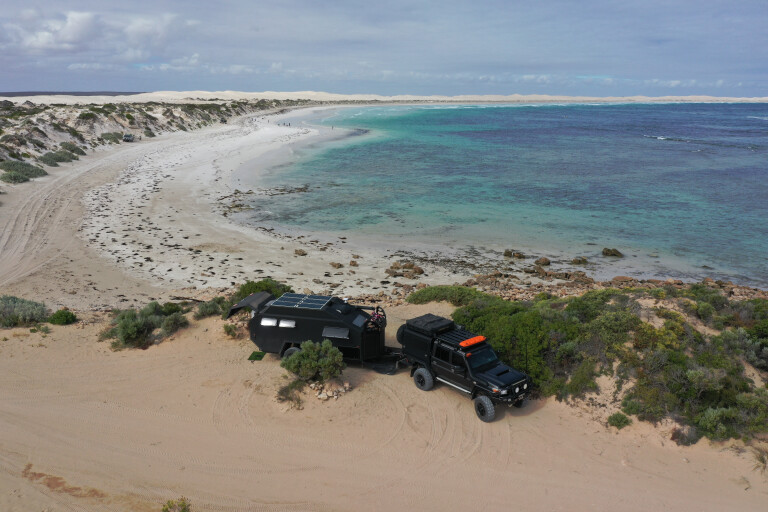
As I said above, we hadn’t done a whole lot of beach camping until we moved to the East Coast of Queensland in our mid 20s, and it was then we fell in love with sleeping seaside. We have probably spent 80 per cent of our travels chasing the coastline.
Another treasured memory of 2021 was our last beach camp in WA at Barred Creek just above Broome. This place is magical, with white sand and blue water and nothing but you and the sound of waves crashing. We had a great night with great mates dancing around the campfire and eating freshly caught Spanish mackerel.
Beach camps around Australia are all so different, too. Perlubie Beach in South Australia was one of our first beach camps of 2021 and we had a blast! We vote Perlubie the most social beach in Australia. You can park your van straight on the sand and the bark huts provided give a great party vibe. We enjoyed happy hour(s) with fellow travelling families for a few nights here. Another great beach stay in WA is Red Bluff along the Quobba Coast, where the waves are some of the most powerful I have seen, and we were able to camp within metres of the shoreline. Drifting off to sleep to those waves crashing was divine.
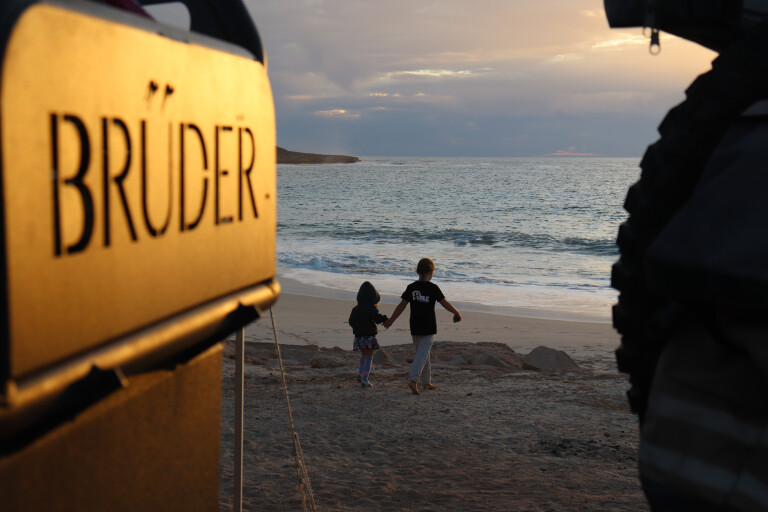
Hands down, our favourite beach camp is Fraser Island (K’gari) in Queensland, and the fact that it is so accessible for us probably has a lot to do with it. However, who wouldn’t love a whole island full of beach camping and four-wheel driving. We love holidaying here every year and the island has so much to offer for all different interests. A 4WD and a bit of planning are essential when visiting K’gari, though.
The best part of beach camping is stepping straight out of the van on to the sand and in to the water for a swim. In saying this, you have tyre pressures, tides and plenty of sand in your bed to contend with when beach camping. It is good to be prepared and know tidal times and the weather forecast, as this can be the difference between a good and bad camping trip.
Whether you hit the dirt or the sand, it is all about exploring this great land and getting out there having fun. What will you choose for your next adventure: Bush or the beach?
Part 14: Catch-and-cook lifestyle
We often get asked by family and friends about day-to-day life on the road, particularly what we eat. After spending more than a year travelling, we have noticed how much we have changed with our eating habits, cooking practices and day-to-day lifestyle.
Travel life has taught us all about eating fresh local produce, simplifying our meals and to be much more relaxed in general.
Let’s face it, being from one of the biggest beef-producing areas of Australia, we have never really been in to seafood or catch and cook. However, travel changed this for us. Before our trip, our idea of seafood was a treat at a restaurant on holidays, but now the kids are requesting fish for dinner most nights of the week.
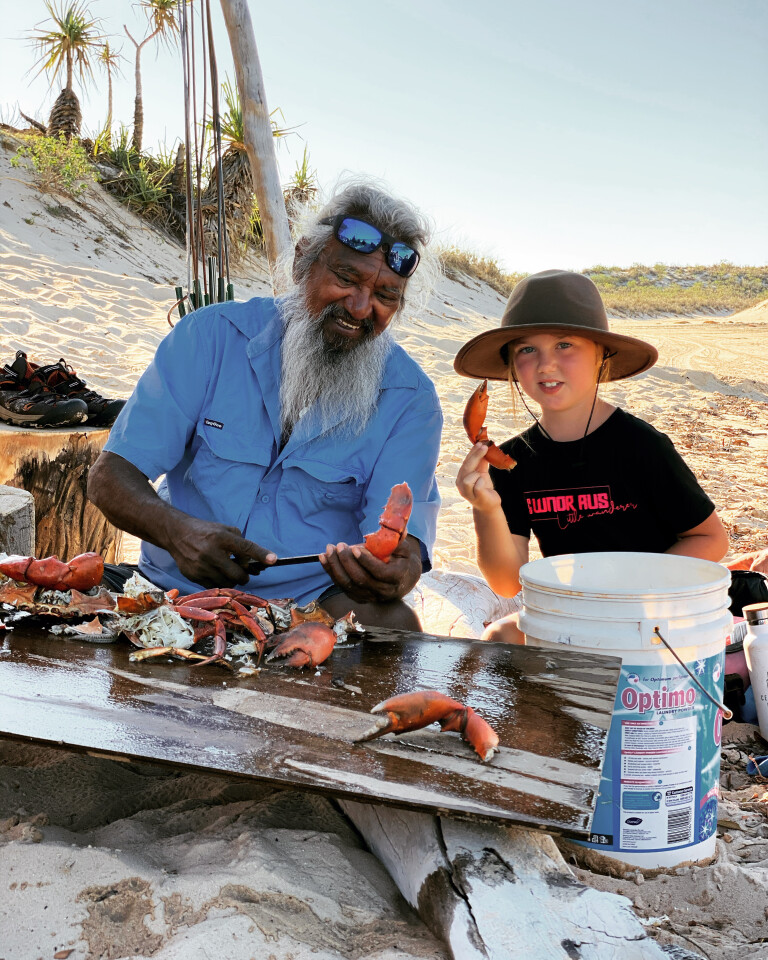
The best part about travelling to different areas is you get to experience the freshest local produce each part of Australia has to offer. In South Australia, the Barossa boasts magnificent food to accompany the wine, while the Eyre Peninsula is famous for its oysters, of course.
Another local delicacy we were introduced to at Perlubie Beach was razorfish, where we had a quick lesson from fellow travellers on how to shell them and prepare them for eating. Our culinary journey continued in Western Australia and again we were spoilt for choice in the Margaret River region, where there are great restaurants, wineries and breweries – as well as the Margaret River Chocolate Company to which we, of course, paid a visit.
While it’s nice to spoil yourself with restaurant food every now and then, our waistlines and hip pockets were feeling it and it was nice to escape all this and get back to natural living once north of Perth – there was plenty of squid and fish to be caught and enjoyed.
One afternoon on Dirk Hartog Island, we pulled up on the beach, threw in a line and caught 10 whiting for dinner. Heading north along the coast we were very spoilt with fresh crayfish and seafood, which, when grilled on the barbie with some garlic butter, makes for an awesome dinner watching the sunset over the water.
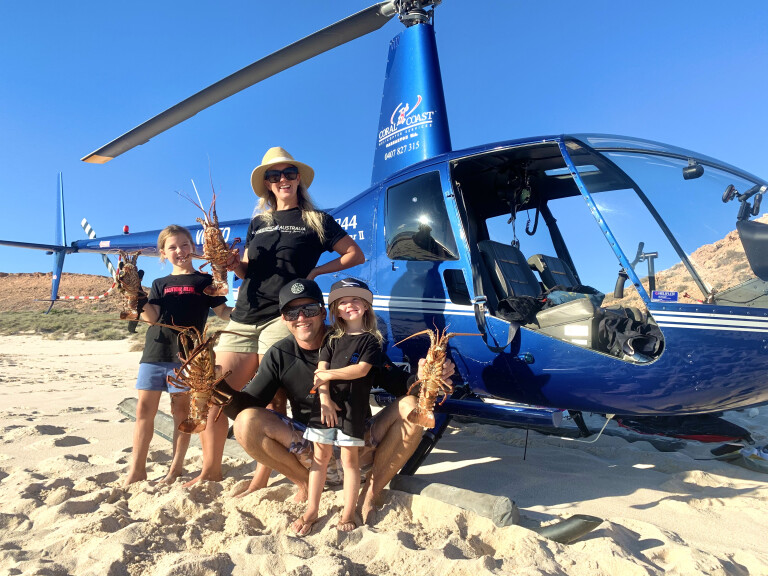
Carnarvon is famous for its fruit and fresh produce, and we enjoyed doing the ‘fruit loop’ and buying fresh fruit and veg straight from the farms. The Ningaloo Coast, while protected for the most part, is famous for prawns; although, we have to say we don’t think they are as good as Mooloolaba prawns in Queensland.
It was around Exmouth that Brendan made the most of spearing and restocked the freezer again. Farther north, around Broome, Brendan had a great time fishing offshore, bringing home a haul of red emperor, blue bone and cod. We also got the opportunity to try some crocodile up north and, while it is a bit like chicken, it has its own unique flavour where it absorbs whatever you put with it.
While at Cape Leveque, we went on a Brian Lee Tagalong Tour, which provides a very informative insight in to how the local Kimberley people live and have done so for thousands of years. Brian shows his guests the abundance of fresh produce to be found in the Kimberley if you just go looking, and he taught us that if we care for our land it will provide.
As for cooking on the road, we initially missed the oven and baking at home but soon learned to live without it – travel life for us is about eating fresh food cooked simply. With limited fridge and pantry space we couldn’t stockpile too much – and in certain climates, particularly up north, fresh food doesn’t stay fresh for very long in the heat – so we had to shop for fresh produce every few days.
"Travel opened our eyes to the wonderful produce this amazing country can provide"
In saying that, there were a few times we had to be organised and do a big grocery shop and plan for meals that didn’t require fresh food. For example, we spent a month in the Kimberley and our fruit and veg ran out after about a week. After this, we relied on frozen veg and ready-to-go pantry items such as packet pasta, two-minute noodles and frozen meat. We never felt like we missed out, but the steak and salad at El Questro tasted bloody good.
So, all in all, when we get asked, “What did you eat?” We reply, “Much the same as we do at home.” With a few differences, though.
Travel life taught us to simplify things with cooking, learn to live without an oven, eat more fresh food particularly seafood, and appreciate the produce available from the area that you are visiting. Again, travel opened our eyes to the wonderful produce this amazing country can provide and we really are spoilt for choice!
Part 15: Meet-up at Rainbow Beach
Earlier this year, we hosted a ‘meet-up’ with all our mates from around Queensland and beyond. This was a joint venture with our good friends Greg and Ellie from @Makntrx_4x4 and we thank them for their help and support.
We all congregated at Double Island Point lagoon at Rainbow Beach and had the best time meeting, greeting and doing what we love – 4WDing and camping. The weather was mostly kind to us with a passing shower every now and then, but that didn’t stop us having the best time in the sand, saltwater and in our rigs.
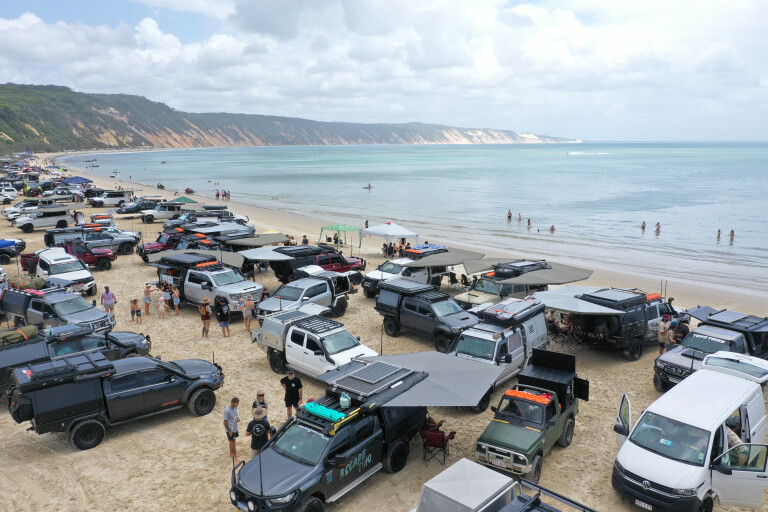
The weekend started off at Rainbow Beach, hitting the Freshwater track in a mega convoy of awesome rigs. We hit Teewah Beach to set up camp among the dunes, where you never get sick of waking up to the waves crashing on a beautiful beach. We had a great couple of nights with drinking, dancing and plenty of laughs. On Saturday, we parked the fleet along DI lagoon beach and spent the day chatting all things 4WD and travel.
The power of social media and how far it reaches blows our minds. We were overwhelmed by the love and support we have received through our social media pages and this was reflected with the number of people who made the effort to join us over the weekend. We wanted to organise a meet-up with likeminded people who love the outdoors, travel and 4WDing as much as we do and, well, we certainly achieved that.
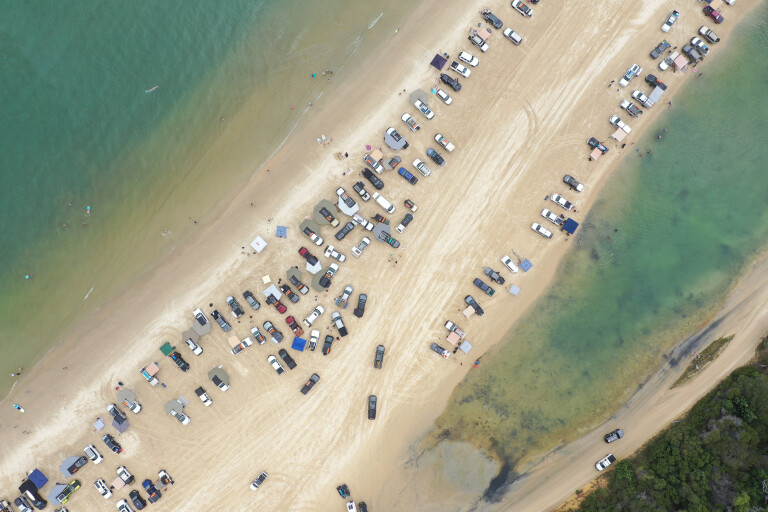
Over the afternoon we met weekend travellers, 4WD enthusiasts looking to set up their rigs, and other families keen to hit the road for a lap of the map. It was also a great opportunity to catch up with all the amazing people we met on the road through the 4WD community. We love spending time with the travel family that has formed through social media, and we’ve made lifelong friends along the way.
We also had a great time over the weekend showing off our new vehicle builds, with months of planning and preparation put in to our rig – as well as Greg’s new GMC Denali. We will reveal more on the rig in later issues, but let’s just say we are thrilled with the next-generation WNDR AUS machine! We were privileged to display and use some great products, and we feel our followers could see the products in action to consider using them for their next adventure.
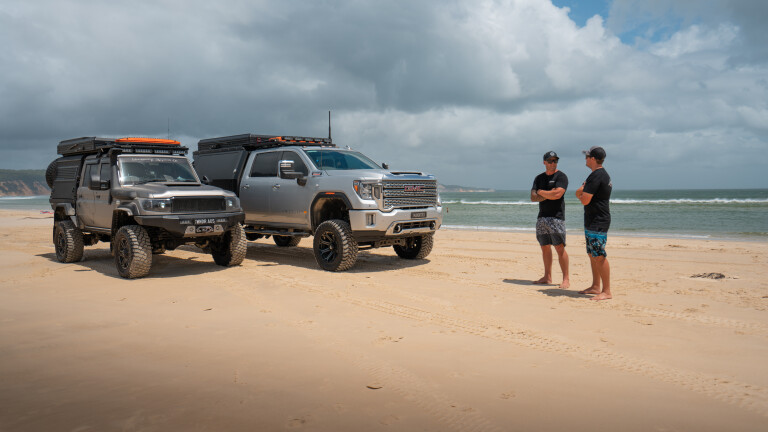
It continues to amaze us how travel, camping and social media can bring so many great people together. Our weekend meet-up reiterated for us that it doesn’t matter who you are, how much money you have, or what you drive or camp in, it’s just about coming together to enjoy the great outdoors and having a good time.
Given the success of this meet-up, we are keen to organise more catch-ups in the future. If you are keen to get amongst it, we would love to see you at our next event. Keep an eye out for our future plans in the coming months. We have really enjoyed our travelling and social media journey so far and are looking forward to many more adventures and meet-ups. See you at the next one!
Part 16: Magical K’gari
One of our favourite places on this planet is its largest sand island, K’gari, or Fraser Island. Just a stone’s throw away in our home state, this island has an endless number of things to do and places to explore.
We have visited so many times and still haven’t seen it all. The landscape is ever-changing with seasons, fires, tides and the human impact, and we’ve been lucky enough to visit at these different stages. We usually do an annual trip to Fraser with a few other families and I feel every year we have a different holiday but always the best time.
While there are a couple of options for getting on to Fraser, we have only ever been via Inskip Point off Rainbow Beach. This is sometimes entertainment in itself; watching people psych themselves up for the run to the barge in soft sand and sometimes they come off second best.
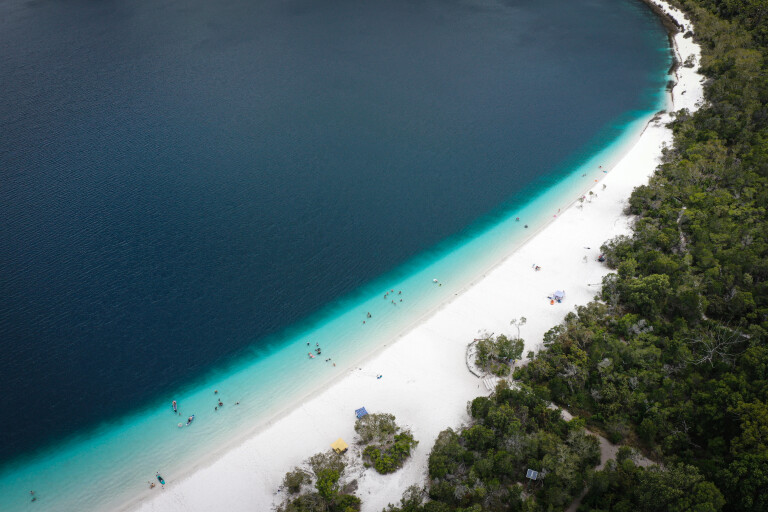
Given Fraser is completely sand, it is important to air down before hitting the barge and there’s plenty of space to do this, along with toilets and camping facilities at Inskip.
We have so many favourites on this stunning island but we would have to say ‘West is Best’ – the west side of Fraser is just magical. We have lazed away many days over at Awinya Creek and other beautiful beaches along the Great Sandy Strait. The sand is so white and water so blue and clear you will often spot rays, dolphins and whales enjoying the west side also!
Camping is an option over on the west and it is simply the best; camping right on the beach, drifting off to sleep to the sound of the waves. It is unfenced camping and quite isolated with no phone reception so best to camp in a group and be prepared.
"K’gari is all about basing yourself somewhere and heading off each day to different spots around the island"
Back over on the east side are an endless number of spots to spend the day. Heading right up the top to Sandy Cape is a bit of a journey but totally worth it if you have the time. Be sure to time your trip with the tides, pack a lunch and do the short but steep hike up to the lighthouse to appreciate the vastness of the Pacific Ocean. On the way to the Cape, you’ll encounter Ngkala Rocks. The southern end is tight and rocky leading on to soft sand dunes with no run-up and can be challenging at times depending on the conditions.
K’gari is all about basing yourself somewhere and heading off each day to different spots around the island. Eli Creek is a popular place all year around, but particularly in summer where you can cool off floating down on the creek’s refreshing spring water. Be sure to get in early for a creek-side parking spot and have your floaties ready!
Another great day area on the island is Champagne Pools where the kids love the natural spa feel when the waves crash against the rocks and fill the pools with fresh bubbles. Again, it can be hard to find a parking spot in peak season, and there’s minimal shade and space, so it’s good to go earlier in the morning or later in the afternoon – tide dependent, of course.
You can’t visit Fraser without spending the day at Lake Mckenzie. It is a bit of a drive inland, around an hour of 4WDing and you guessed it, the track can get busy in peak season. Lake McKenzie offers white sand, and the bluest of blue water where you can soak in the shallows, stand-up paddle board, and the kids can splash about for hours. Complete with toilets and fenced eating areas, Lake McKenzie is another favourite day trip for our family.
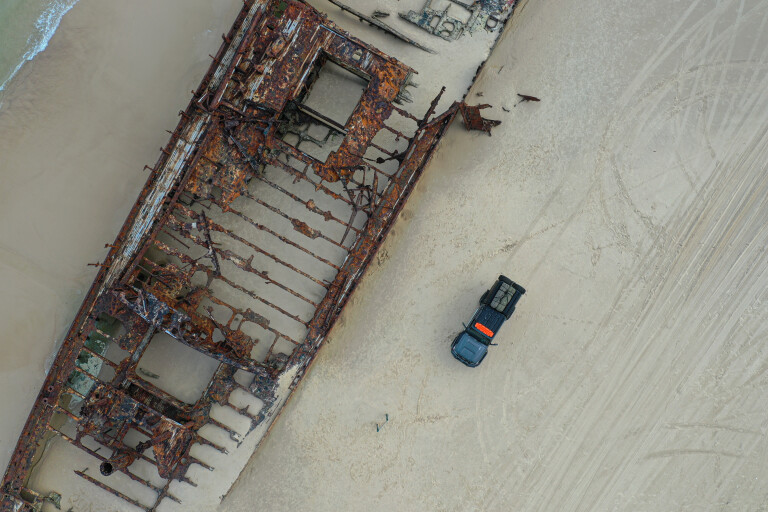
In terms of camping and accommodation, there are a few different options across Fraser. You can true blue camp almost on the beach and this is usually what we prefer. We have never had any trouble with the locals AKA the dingoes as long as you keep your food scraps packed away up high, watch the kids and don’t walk anywhere alone. There are also fenced camping areas around the island providing protection from dingoes, and toilets and showers.
Another good option for the camping experience without the set up and pack up is the pre-existing tents at Cathedrals campground complete with one or two bedrooms, front deck and furniture.
You can also hire linen and there is fuel, a bar and café in the campground. If you’re not the camping type, there are also a couple of resorts on the island and if you’re not sure about 4WDing there are plenty of tour operators and 4WD hire services based at Rainbow Beach.
K’gari will always hold a special place in our hearts and we love visiting every year, back to our old favourites but also discovering new spots. The memories we have made will last a lifetime and we just love watching our kids experience such a beautiful part of our country!
Part 17: Dollars and sense
Money. It’s the topic most people want to know about but don’t want to ask. However, it is one of the most fundamental aspects of travel life, and obviously travel is not possible without some amount of money.
We always maintain that no matter your budget, you can have the most amazing time. It is not about what you own or don’t own, it’s about getting out there and spending quality time exploring this incredible country.
On our first big trip in 2020, we were much more budget-conscious and established a dedicated bank account for travel. This way we could deposit a certain amount of money in the account and budget for that amount to last a certain period of time, as a way of controlling our spending. Using a single account was also a good way of keeping track of where our money was going.
However, in 2021, we got a bit lazy with budgeting and the budget blew out a fair bit with increased travel distances, more remote locations and doing a few more big-ticket tourist activities. For both 2020 and 2021, we just saved hard in the preceding years and Nikita took some paid leave from work.
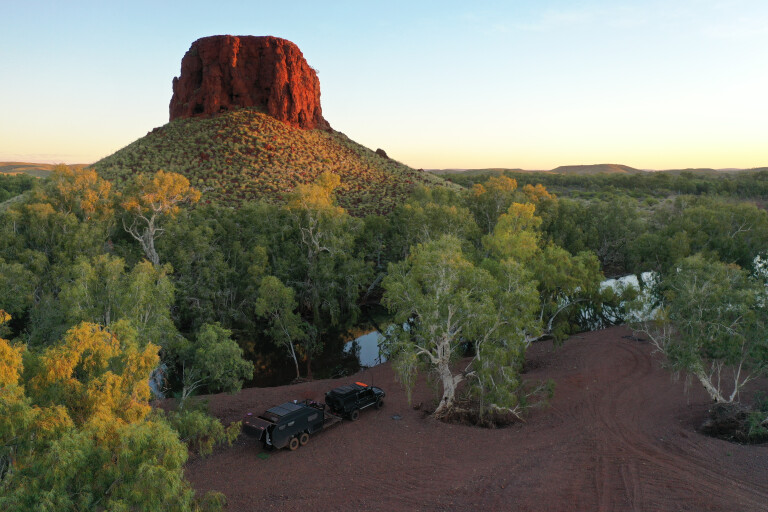
People often say to us, “How can you afford all this?” and we proudly tell them we paid every cent for what we own, and we worked and saved hard for our travels. We also lived on the road, so our van and car were our home and our biggest assets, as is the case for many travelling families we have met along the way.
We have found fellow travellers all do it differently when it comes to their homes and vans. Some, like us, make their van their home and put furniture in storage; some people lock up their homes; while some rent out their homes or use house-sitters – no one way is the best way, as everyone’s circumstances are different in that regard.
One of the biggest killers of our savings is fuel. Especially driving a V8, we spent a majority of the budget on diesel. As well as this, the more remote you go, the more expensive it gets, with $3.30 a litre the most we have paid for fuel. However, in the current climate, this is almost a regular price at most bowsers! You can be thrifty and save money at the bowser with fuel apps on your phone, planning ahead for areas where fuel is more expensive and carrying fuel with you (weight permitting) if needed.
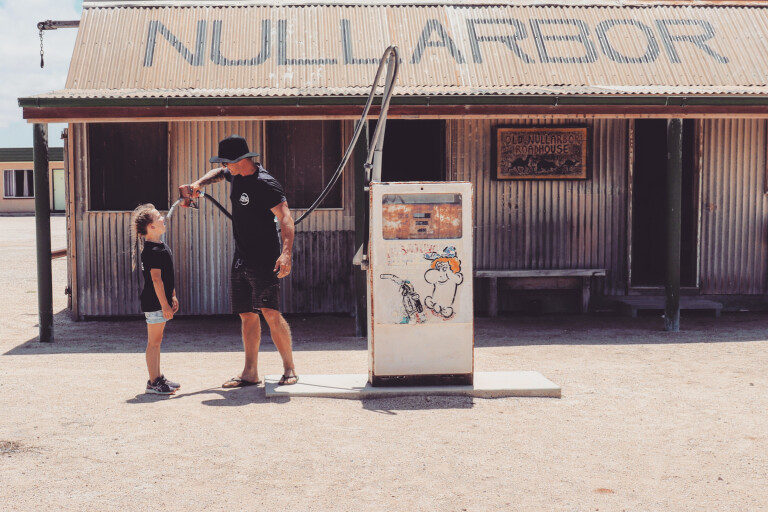
The second biggest cost on our trip is food! Nikita admitted to always over-shopping when it comes to groceries, and travelling did teach us how to curb this, as we simply did not have as much fridge and pantry space. As time went on, we got better at only buying what we needed and learning which meals and foods were better to cook when living out of a caravan. When travelling along the coast, catching our dinner and eating fresh produce also helped both the bank balance and our waistlines.
We also made a point of trying not to eat out or get takeaway more than once a week. Initially, it is tempting to live like you are on holidays and eat out at pubs and restaurants all the time, but this gets very draining financially; plus we often weren’t near a grocery store let alone a restaurant. Again, if you put a bit of time and effort in to budgeting and planning, you can spend less on food on your travels. It’s all about reaping nature’s rewards (legally, of course) and being a savvy and organised grocery shopper.
Another place our money goes is doing touristy things and activities and, as many of us know, the more children you have and the older they are, the more expensive it is. We may suffer from FOMO but we didn’t want to miss the big-ticket items such as diving with the whale sharks, Horizontal Falls and sailing the Whitsundays – and while none of these things or any of the tourist experiences are cheap, they are worth it.
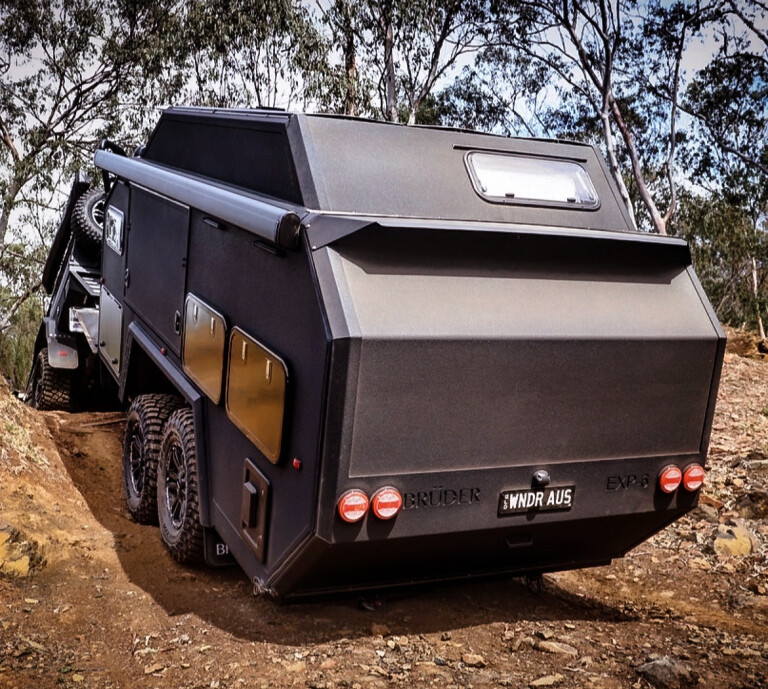
I guess it’s all about prioritising which things are bucket-list items and which things you can leave for another day, and then getting the most out of those things you do pick. However, some of the best times we had on our travels were watching western sunsets at free beach camps with mates, and this is absolutely free and priceless.
Camping and caravan park fees are another consideration with budgeting, and many government bodies in each state have started charging fees for previously free campgrounds. Obviously, free camps are the cheapest and best option, and we reiterate that if you are using a free camp please respect the property and look after it – leave only footprints and take only memories.
Again, it’s all about planning ahead to book in low-cost camping, occasionally splurging on amenities and a swimming pool, and realising that you won’t stay in a five-star campground all the time. There will be nights on the side of the road and, as mentioned, some of the best camps we’ve been to are free or cheap.
Unfortunately, travellers also have to keep in mind that some weekly or monthly payments don’t stop, just because you are travelling. Things such as insurance premiums, rates for homeowners, healthcare costs, phone bills and registrations need to be budgeted.
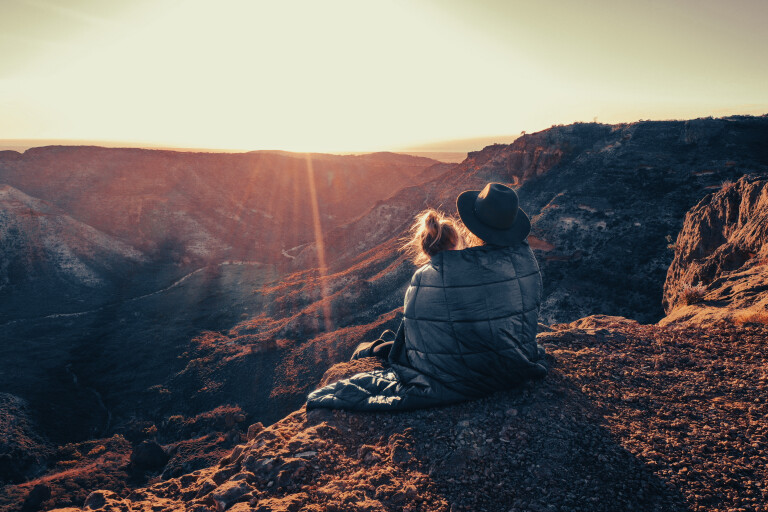
Another thing, which we have talked about in a previous article, are vehicle repairs and potential breakdown costs for both your vehicle and your van. Accidents and breakdowns happen and are not always covered by insurance, so it’s good to have a kitty stashed away for emergencies.
You don’t need to be absolutely loaded to travel Australia, but it is good to consider money and finances and have a bit of plan. We always say, “Just like having children, there is no right time to travel. Just do it!”
It doesn’t matter how much you have in the bank or how you get around, it’s all about getting out there and living the dream. We need to make the most of this safe, free and naturally spectacular country we call home while we can. So, get out there and start spending – spend the kid’s inheritance, spend that rainy day fund and, most of all, spend precious time with your loved ones.
Part 18: Top tips for a family hike
Our recent weekender to Carnarvon Gorge in Central Queensland prompted us to think about all the walks and hikes we have done as a family. Mind you, we still have many more out there waiting for us.
Brendan was often dragging us out of bed to hit the dirt nice and early, but we always thanked him later when we got to witness the best the Aussie bush has to offer. After doing a few hikes dotted across Australia, we decided to share with you some of our thoughts and tips for bushwalks.
GO EARLY
We found on our trips that if we got up right at sunrise or sometimes even before, we seized the best part of the day and were privileged to witness some of the most beautiful sunrises. By going early, we avoided the heat of the day and would be back at camp by lunch to do some schoolwork and have a rest.
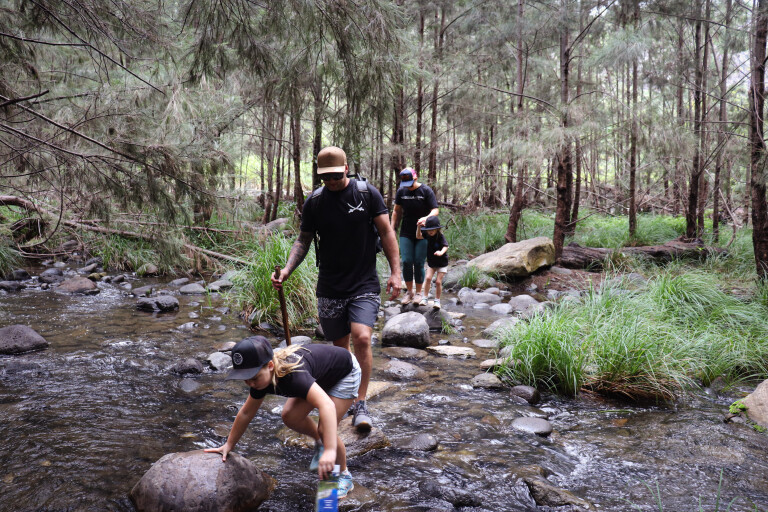
When we climbed Mount Augustus in Western Australia, we were up at 5.30am to hit the track by 6am. We had to start early with this one as it is a 12km return to the top of the largest rock in the world, and it took us (four adults, a seven-year-old and a three-year-old) seven hours. In this case, we were so glad to be up early to appreciate the most amazing views over the Gascoyne Region, and it was well-worth the 1200km round driving trip and big hike up the rock.
We got in to a good pattern in the Kimberley, getting up early for gorge walks. Despite being there in August, it would still get pretty warm in the middle of the day and it was nice to do these walks in the cooler mornings.
BE PREPARED
In terms of what to take, we invested in a Pelagic waterproof pack. They’re not cheap but definitely worth it for hikes, especially through Karijini National Park. We could swim right through the gorges without getting any of our stuff wet, and this is super important when taking cameras and media gear.

Another good investment, especially again with Karijini and the Kimberley, are reef shoes. They are so good for gripping on to rock ledges when climbing waterfalls, and also when you get your feet wet, which you do in most of the gorges in Karijini.
When going on walks, we always made sure to pack snacks, plenty of water, sunscreen, sometimes insect repellent, media gear (we used the GoPro most often), a towel and sometimes a snake-bite kit. Remember to always make sure you have your phone charged and, if there’s no phone reception, it’s a good idea to let the ranger/caretaker know where and when you are going in case of emergency.
GIVE THE KIDS GOALS
We did struggle at times with the kids getting tired or bored, or just getting on our nerves! When Bella was younger, we visited the Grampians and discovered if we put headphones on her, she was distracted by the music and found her rhythm and just kept walking. I guess the downside to this was she wasn’t taking in all her surroundings and sometimes couldn’t hear us, but we found it useful to keep her going.
Another thing we find useful with our children is giving them something to work on. Recently in Carnarvon Gorge, I got them to count the number of water crossings (as there are quite a few here) and told them if they got the right number at the end of the hike, they would receive a prize.
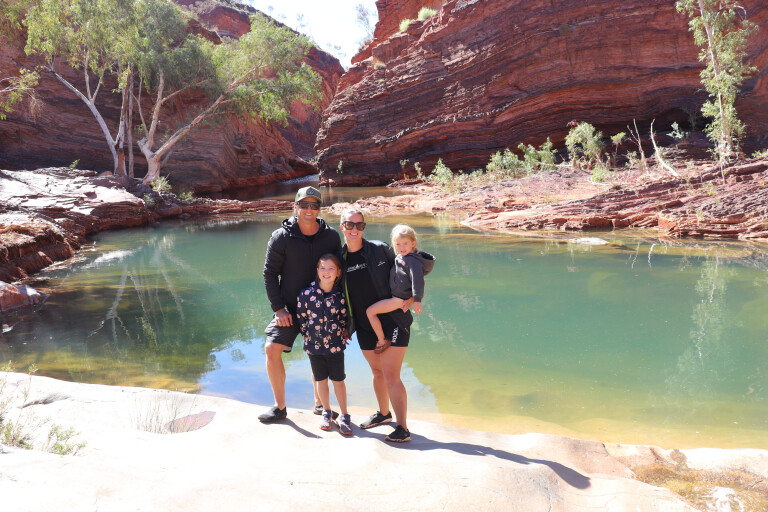
This again distracts them from thinking about how tired their little legs are. We quite often do this with different things on hikes, such as count how many animals you can see, or get them to find the next marker if there are markers on the ground, as there are on Mount Augustus.
There have been times they have seen right through this trick and it doesn’t always work, but it’s a good one to give a try if the kids are getting over it. Our older girl Bella is now old enough to be interested in reading the maps (if there is a map) and giving directions. This is a great learning experience and can be incorporated in to remote learning/home schooling.
Our little one likes to sing “The Ants Go Marching” or “We’re Going on a Bear Hunt” and somehow never gets tired of this! Another good idea for bushwalks with children is to take lots of snacks – they seem to burn through energy and snacks keep them going and distracted.
GO WITH FRIENDS
The thing we found most useful for keeping kids entertained is going with other families. It is much more fun when you are in a small group, and there are so many benefits to hiking like this. If there are a group of kids together, they have the time of their lives and, before they know it, we’ve reached the end of the hike while they’ve been yarning and playing.
I find boys tend to make it a competition and see who can climb the best or run the fastest and girls usually skip along with their mouths moving faster than their legs the whole way.
Going with other families makes it so much more enjoyable for the adults as well. It is also much safer, where if anything was to happen there are other people around – safety in numbers as they say. We have done most of our hikes with mates and it is so much fun.
We have many more hikes to tick off our bucket list and are always looking forward to our next adventure. Where will your next adventure take you?
Part 19: Queensland's stunning Central Coast
Towards the end of last year, we spent a couple of months exploring the Queensland Central Coast from Airlie Beach and the Whitsundays down to Yeppoon. There are plenty of great camping spots and places to explore along this beautiful section of the Queensland coastline.
It also hosts the southern end of the Great Barrier Reef, and we had plenty of opportunity to enjoy this natural wonder from both afar and plunging in to the deep blue.
Airlie Beach is a must-visit and quite often the gateway for travellers to the Whitsundays. It is such a bustling little town full of tourists, backpackers and the best party atmosphere.
While at Airlie we stayed at the Big4 Whitsundays, which is a great park for kids. Our girls had an awesome time on the 25 – yes, 25 – waterslides in the pool, playing minigolf and exploring the multiple playgrounds. It’s definitely a family park and a great place to set up and explore the Whitsundays.
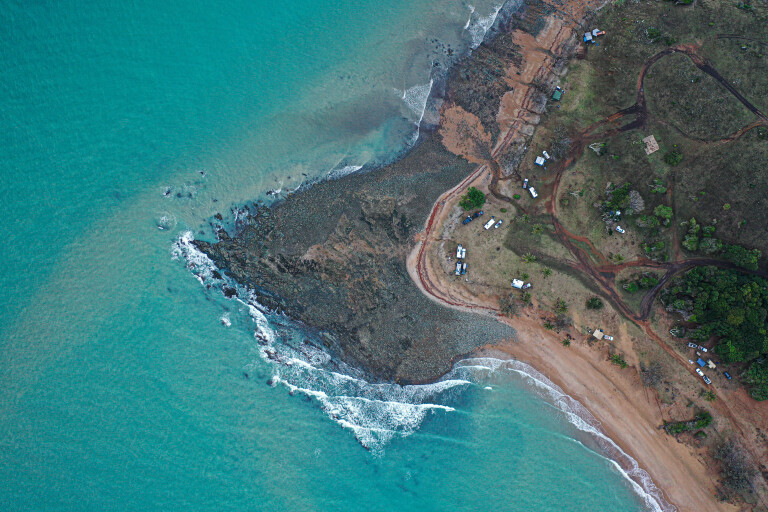
We went for a day trip to Whitehaven Beach, Hamilton and Daydream Islands for a great day out with just a little bit of everything the region has to offer. You could certainly spend weeks and plenty of money exploring these islands, but we opted to spend most of our time in Airlie.
After leaving Airlie Beach we headed not too far down the road to Cape Hillsborough. This is a bit of a hidden treasure with a small tourist park set in the Cape Hillsborough National Park. We parked here for a couple of nights and enjoyed the walk to the lookout early one morning, as well as the walk out along the cape at low tide.
The highlight of our stay here, though, was getting to see a mother turtle returning to the ocean after laying her eggs early one morning. These creatures are simply amazing. We spotted her while on the beach at sunrise feeding the kangaroos. Once again, enjoying everything nature has to offer.
There are also some great camping spots inland of Mackay and we spent a night at Kinchant Dam, a fantastic spot for boaties and skiers, before a couple of nights on a farm stay at Finch Hatton Gorge. We did the walk in to Finch Hatton Gorge and enjoyed a refreshing swim at the end. This is another great little national park well-worth a visit.
We also pushed the 79 up the range to Broken River, which is a perfect camping spot for tent campers in dense rainforest complete with awesome walking tracks, views and the most adorable wild platypus. I think it is one of the few times we have kept the girls quiet for a good 10 minutes, watching the platypus just doing its thing.
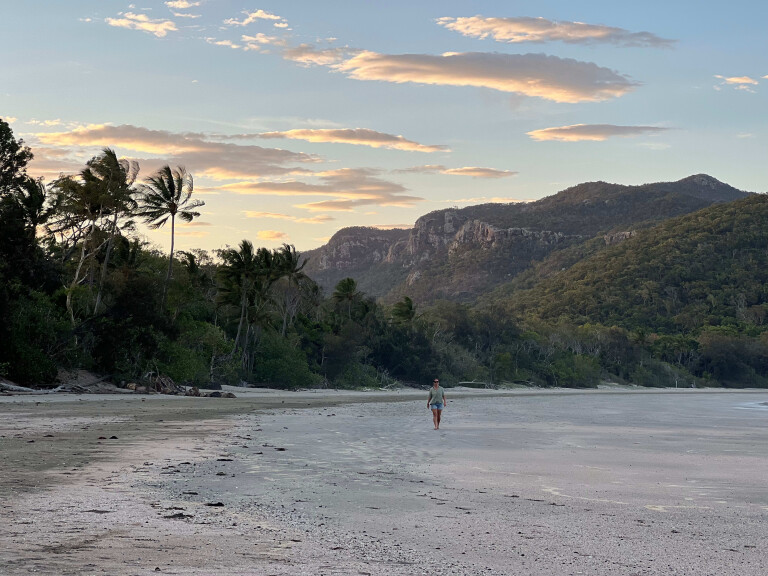
Our next stop down the Queensland coast was at the much-anticipated Notch Point. We had heard our travel mates talking about how this was a great free camp right on the water, and they weren’t wrong. Notch Point is set on private property an hour out of Mackay. You need to be fully self-sufficient and at least semi off road-capable to enjoy Notch Point. There is no power, water or facilities, but this didn’t worry us and the views and location definitely make up for it.
The trip in is mostly dirt road and requires a bit of negotiating around trees, cowpats and mud holes. We had a great time with some mates getting through the mud after 20mm of rain the night before. We tested out the Bruder Expedition’s tipping point when the 79 hit a mud pit and almost lay her on her side, making for a great shot and some fun in the mud!
As expected the 79 gracefully pulled her out and back up on dry ground. We camped right on the water and spent a few days just relaxing with no phone service or hustle and bustle, for a good recharge before hitting Yeppoon.
We absolutely loved Yeppoon and spent a week exploring the area including Byfield National Park and Great Keppel Island, but we’ll let you know all about this another month. You could spend weeks exploring the Queensland Central Coast as there is something for everyone; white sand beaches, beautiful nature hikes and attractions, and some great four-wheel driving adventures.
Part 20: Golden Outback
For our new Bruder’s maiden voyage, we decided to take a week of the school holidays and explore some of Queensland’s golden outback. We were blessed with good weather over the week, but we travelled just after a decent amount of unseasonal rainfall and everywhere we camped was boggy, muddy and ripped up from previous travellers. It was a fairly action-packed week, covering 3000km in eight days, but we had the best time discovering all that Western Queensland has to offer.
Day 1: Roma to Blackall
We hit the road fairly early and left a very chilly Roma heading west along the Warrego Highway through Amby, Mitchell, Morven and Mungallala. We had a quick smoko stop at Augathella and checked out the murals through the town and the artwork on the water tower.
Our next stop was Tambo, home of Tambo Teddies and Fannie Mae’s Café. We rounded out the day in Blackall at the showgrounds as the riverside camping was a very busy mud pit, and took the afternoon to wander down the main street. Blackall hosts the Jack Howe statue – one of our most famous shearers – some great artistic Blackall signs and the Big Ram at Ram Park. Another great little western town.
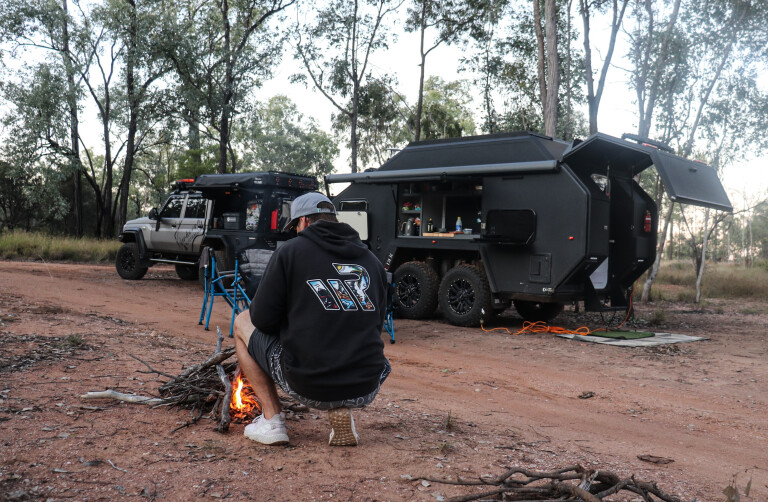
Day 2: Blackall to Longreach
Heading northwest, our first stop was Barcaldine, just an hour up the road which is a T-junction for the western highways. Barcy is home to the Tree of Knowledge and there is a great display explaining the famous tree, the historical Shearers’ Strike and formation of the Australian Labor Party. Being a Sunday and a very small town, there wasn’t much happening at Barcaldine, but there was plenty going on at the Wellshot Hotel at Ilfracombe.
Just 27km out of Longreach, this town is really just the pub and a few houses, but what it lacks in size it makes up for in personality, and we were warmly greeted with hot coffee and cold beer.
That afternoon we arrived in Longreach and checked out the QANTAS Founders Museum before heading to the river. We were a bit underwhelmed by the QANTAS Museum, but it was interesting to learn about Australian and Queensland aviation history and we feel aviation enthusiasts would love it. We camped the night at the Apex Riverside Park along the Thomson River and it was a great little spot, just a bit boggy.
Days 3&4: Longreach and Winton
We couldn’t visit Longreach without stopping by the Australian Stockman’s Hall of Fame, and it was just as informative and interesting as I remember. We had a great morning learning all about these hardworking men and women who have worked our land for the last couple of hundred years. The visit was complete with a live performance showcasing horsemanship, working dogs and even a big, beautiful Brahman bull. This was entertaining and the kids loved it.
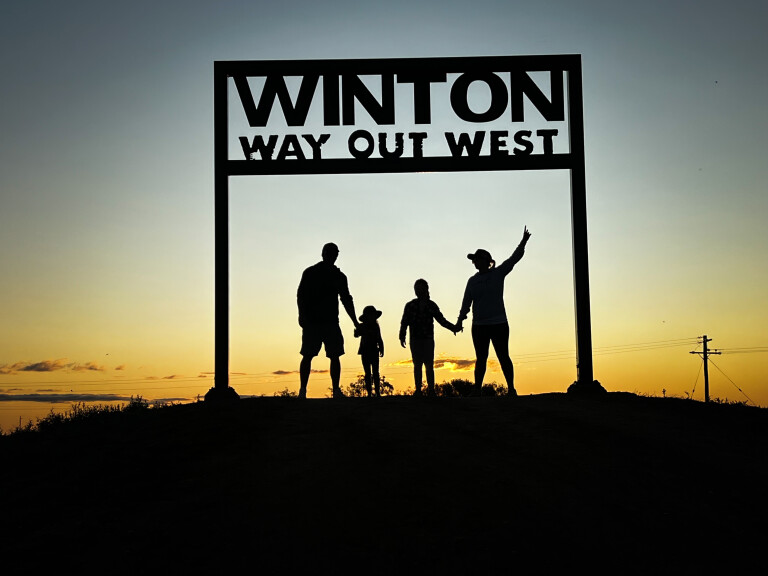
After having some lunch and a rest at the park, we headed an hour west down the road to Winton. This is another great little welcoming community, and we pulled up stumps at the showgrounds which had also seen plenty of rain.
After being on the highway so much, we had a chill day in Winton and headed out of town around 20km to visit Winton’s famous Age of Dinosaurs. This is a great tourist spot and they have done such a great job both discovering and displaying the incredible dinosaur fossils of the area. Set on private property, the museum has different exhibits and tours that keep you entertained for the better part of a day. Again, the kids were well-educated and entertained. We spent the afternoon exploring Winton and the Crackup Sisters house, and we finished off with dinner at the local.
Day 5: Winton to Julia Creek
The road from Winton to Julia Creek was a really nice drive as it was so green, and we stopped halfway at the Blue Heeler Hotel, Kynuna, for a coldie and to leave our mark on the wall. I was amazed how thick the flies were, even in winter.

Julia Creek is another awesome country town and the Julia Creek Caravan Park, complete with artesian bathtubs, was on our to-do list for this trip. We had a great time relaxing in the baths (when we could, with two rat bags), enjoying the wine and the cheese platter you can order from reception. We then struck up conversation with some fellow travellers and had a great night chatting around the campfire.
Day 6: Julia Creek to Muttaburra
This day was our longest driving day by far, and due to the rain and road conditions we couldn’t take the shortcut, so we went through Richmond, Hughenden and Torrens Creek on our way to Muttaburra. We also took the time to check out the silo art at Hughenden; it’s such an awesome piece of art by Drapl and The Zookeeper. We finally hit some dirt and christened the new Bruder before camping beside the creek at Muttaburra, enjoying another beautiful outback sunset.
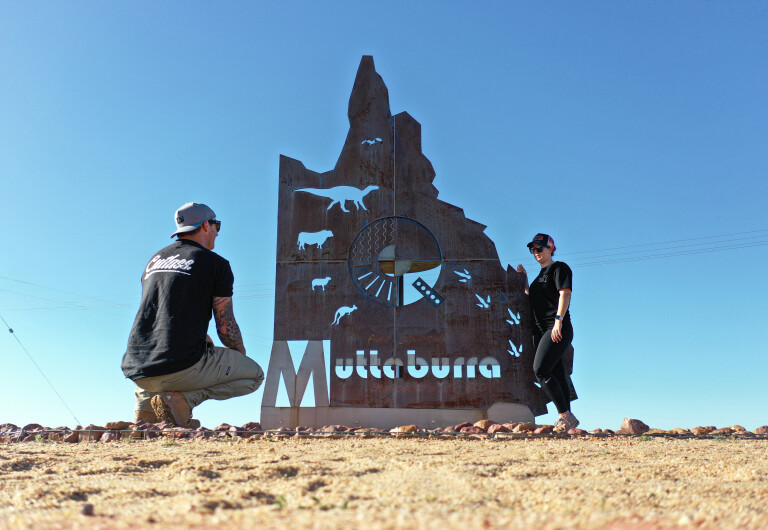
Day 7: Muttaburra to the Gemfields
Muttaburra surprised us; for such a small town it has a decent amount of tourist attractions and is the geographical centre of Queensland. We went on a tour of the old general store, storekeeper’s cottage and hospital, all of which have now become museums.
Barcaldine Regional Council bought these buildings and preserved them in their original state; and it was so good to see how it was in the “olden days”, as Bella would say. Muttaburra also has a Muttaburrasaurus display, tying in with the dinosaur story of the west, and a very cool sculpture trail that extends all the way past Aramac, showcasing amazing craftmanship by locals with scrap metal and welding.
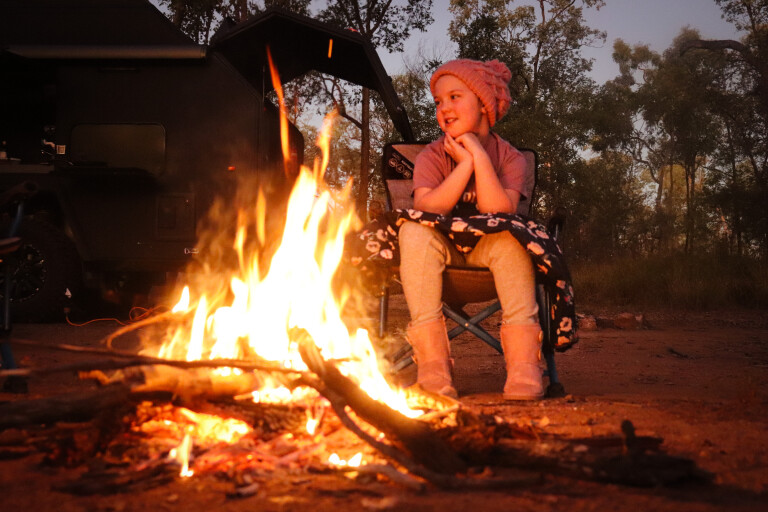
Day 8&9: The Gemfields
We spent our second weekend away exploring the collection of small communities that makes up the
Gemfields. These communities are full of colourful characters all looking to find their fortune with that one, big gem! You can try your hand at fossicking yourself, or just buy ready-made in the form of stunning jewellery, as your souvenir. This place is worth checking out and you can camp out in the bush, stay at the local ’van park or head out for a day trip from Emerald.
We had the best time on our mini-trip of Western Queensland. We all learnt so much about our history and the Western landscape and had so much fun doing it. We highly recommend you get out of the cities and explore and support our country communities.
Part 21: Building bonds
We are going to get a little bit deep and talk about relationships and travel. We are building relationships all the time right, and this certainly rings true when full-time on the road.
Before setting off on our trip, we’ll admit there was a bit of apprehension from both ourselves and other people about how travel life would impact on our marriage, relationship with our kids, family and also meeting fellow travellers. Well, we can now say that 99 per cent of the time we had the most amazing experience and it’s one of the best things we have done for ourselves and our kids.
Many people may think that living in a confined space with your partner 24/7 will be a challenge in itself and trust us, it’s not always unicorns and rainbows, but on the whole, it was such a positive experience for us as a couple. We have always gotten along most of the time, otherwise why would we put up with it right?
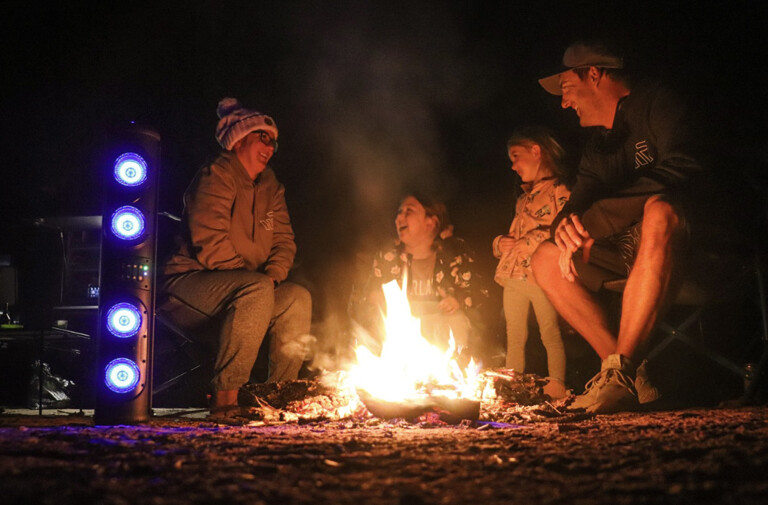
Both of us are relatively independent people, happy to do our own thing but also work well as a team. We found that just ‘stopping’ with the business of regular home life helped us to sit back and focus on our relationship and made our marriage stronger for it.
We both assumed our roles fairly early on in our travels with Brendan being chief operator/driver/handyman and me chief navigator/organiser/chef. I feel Brendan pushed me out of my comfort zone with many of the experiences and 4WD tracks and showed me living for which I am forever grateful.
Brendan says he learnt how to push me out of my comfort zone, without pushing me over the edge. He also feels I helped him open his mind to different cultural experiences, history lessons and cuisine that he may not have sought out naturally.
Don’t get me wrong, we had our fair share of arguments along the way as well which is completely normal in a healthy marriage and we realised quite early on the importance of ‘me time’. In Brendan’s words, “You need an out” and we made sure we took time out from each other and the kids to focus on self-care.
This often meant going for a run or a workout, Brendan going fishing with mates or on his own, me going to the shops/salon or even just going grocery shopping without the kids – I found this quite therapeutic, weird I know!
It’s really important in general, but particularly when travelling, to make that time for yourself. In terms of special adult time, you can imagine it is rather difficult to achieve this with the kids at your feet, however, you find a way.
Some friends of ours Macgyvered a privacy curtain in their van, others helped each other with babysitting for date nights and you can use your imagination – you learn to get creative in the great outdoors!
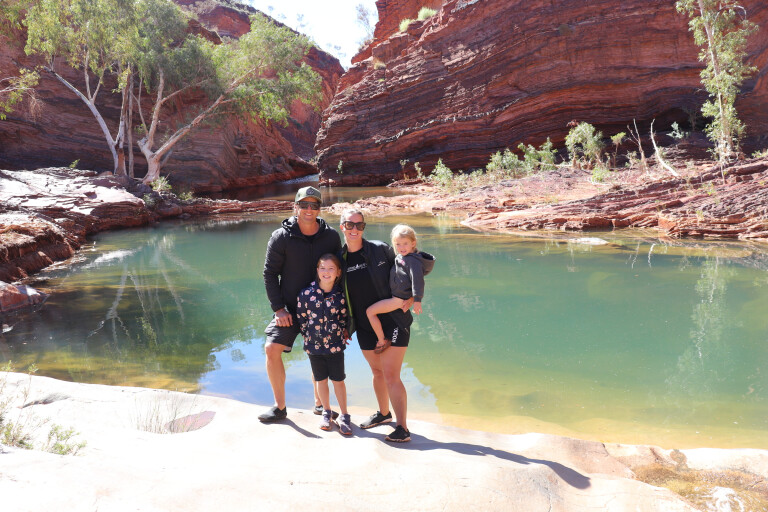
Speaking of our cherubs, one of the reasons we decided to set off travelling was for our children. We wanted to give them an amazing experience, lots of life lessons and spend precious time watching them grow and learn. I found with my occupation, I don’t get to spend a whole lot of time with the girls and this was an opportunity to learn from them and with them.
I was a bit worried about it to be honest, just in terms of “would it be too much, having them 24/7?” and “would they be okay being away from family, friends and formal education?” However, I didn’t need to worry as it was so much more than I expected. I got to watch them experiencing the most amazing things and places our country has to offer and learned so much more about my girls then I ever imagined.
Travelling full-time enriched our relationship with our children and made us better parents for it. Again, it wasn’t always rosy and we did look forward to date night with a babysitter when we were able.
Making new friendships was one of the best parts of travel life and we have talked about this in previous articles. Travelling is so social and you just need to be outgoing and say “hi” to your neighbours and fellow travellers and you will find you have made friends for life. We met people from all walks of life and it was so special to pay it forward with travel tips. What we gained from previous travellers we could then pass on to future travellers.
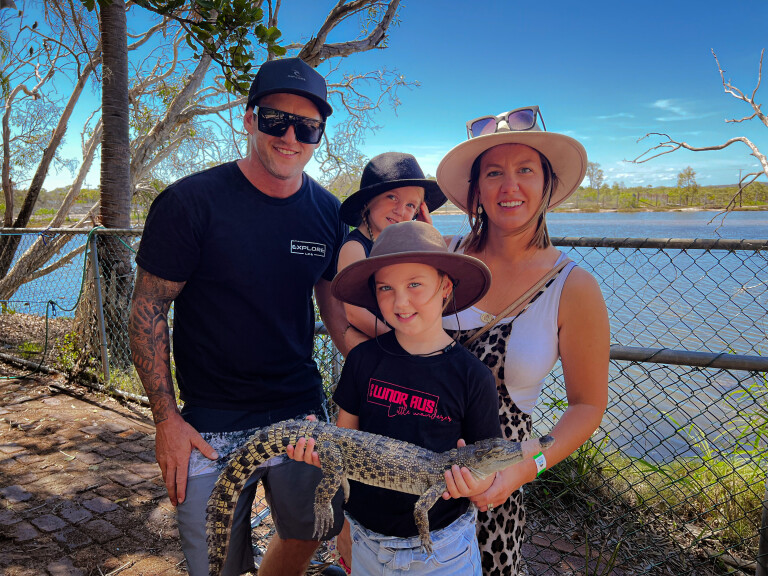
One of the best ways we saw our travel community shine was when a fellow travelling family unfortunately lost their home on wheels to fire. We all banded together with love and support and the family was able to purchase flights to travel home. It was so heart warming to see those relationships shine to support a fellow family.
We also feel travel has changed our relationships with our family and friends at home, mostly for the better. We definitely missed everyone at home, we missed milestones, new babies, significant events and this made us sad, however, it also made us value those we left behind.
We also had to make a mad dash home through the middle of last year when Brendan’s pop became terminally ill to spend his last days with him which we don’t regret in any way. This made us realise the downside to being so far from home, but he wouldn’t have had it any other way.
Relationships on the road have their ups and downs (pun intended) but overall travelling has enriched our lives in so many ways. We’ve learnt so much from each other, our beautiful kids, our loved ones holding the fort at home and the fabulous families we have met along the way. Just another benefit of travelling this amazing land, so get out there and just do it!
Part 22: Southern Cape York
Anyone who has travelled to Australia’s most northern point will agree, this journey is an adventure like no other.
After months of planning, discussing and packing, we set off with three other families on our adventure to the tip and we had an absolute ball! We highly recommend travelling Cape York with mates, especially with all the 4WDing along the Tele Track. However, we will talk all about the Tele Track next month, this month is all about the southern Cape York Peninsula from Cairns to Bramwell.
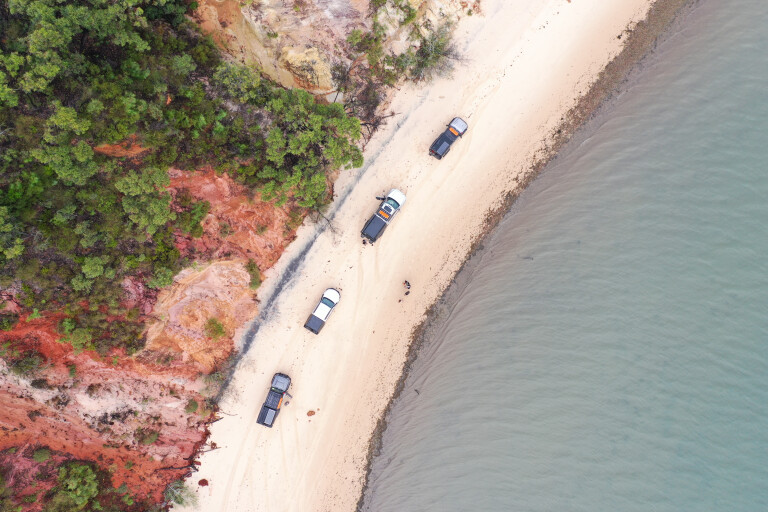
The weekend we had in Cairns was not the best weather and we didn’t really explore the area too much, just used the opportunity to stock up on groceries, spare parts and supplies. We had come from all over Australia to meet in Cairns and hit off the trip with awesome cocktails and parmys from the Cairns Coconut Bar.
Cairns and the Daintree can be a trip in itself, and we had a great time exploring the rainforest. The Mossman Gorge walk is an enjoyable and easy 7km hike through dense forest complete with a cool suspension bridge and refreshing swim at the end.
Another great tourist spot to visit is the Daintree Discovery Centre which is an informative insight of this amazing rainforest and the flora and fauna that inhabit it. A mandatory stop through the Daintree was the Daintree Ice Cream Company before checking out Cape Tribulation, a beautiful secluded beach that reminded us of a scene out of Cast Away.
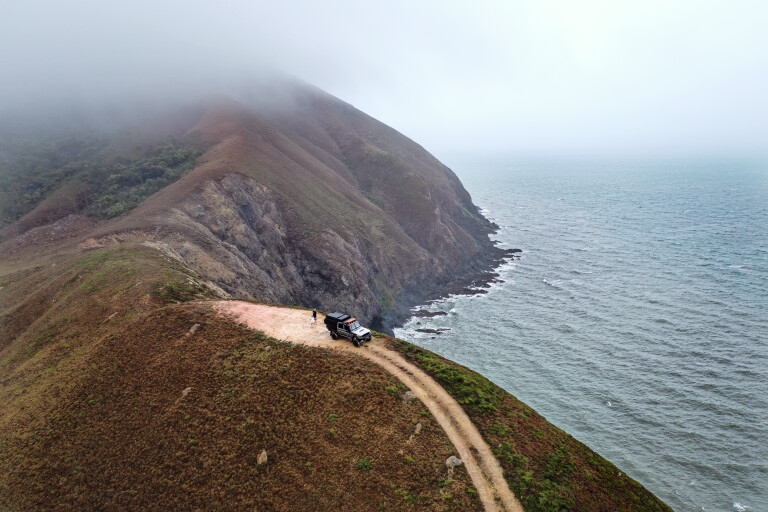
The road along the coastline from Port Douglas to the Bloomfield Track is a stunning drive and exceeds itself with the rainforest meeting the sea. The misty rain continued and we felt like it was following us, but that just added to the challenge of the Bloomfield Track.
The Bloomfield Track was a great start to the tracks we covered over the Cape and is a beautiful scenic rainforest drive with some serious hill climbs. While it wasn’t recommended to tow on the track, we successfully pulled our off-road ’vans and trailers through, showing that with care and good brakes, it can be done.
All the steep sections were concreted which helps, but it’s important to know that we undertook this at our own risk; this is no track for the average traveller and there is signage advising towing as not recommended. What a beautiful drive though, and a great start to the Cape.
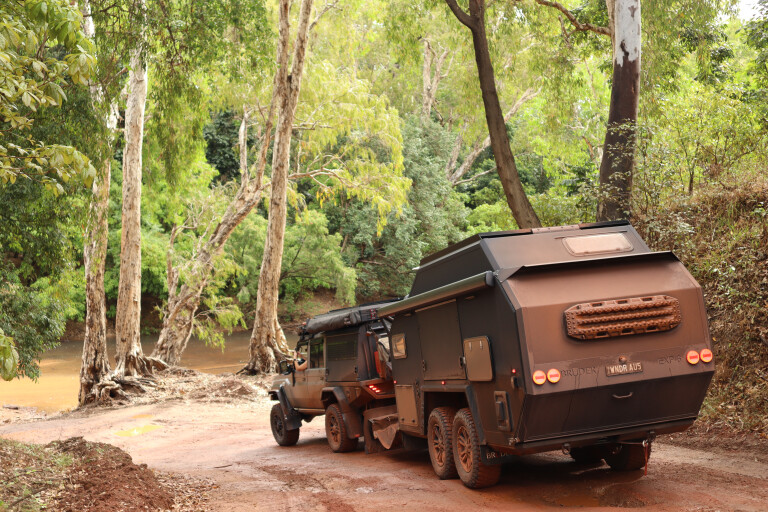
We rounded off the day with a drink, or 10 at the legendary Lions Den Hotel. It’s a great place, full of memorabilia, offering scrumptious pizzas, cold beer and live music. The best part is you can stagger back to camp just a few metres away.
Over on the east coast at the bottom of the Cape was our next stop and our first beach camp: Eddies Camp Ground at Elim Beach. We spent a few days exploring the surrounding 4WD tracks around Cape Flattery and Cape Bedford and was heaps of fun. These were not difficult drives and a good way to spend the day on the sand.
Our trip continued north-west through Rinyirru (Lakefield) National Park, stopping at Old Laura Homestead for a short history lesson and camping along the Laura River complete with a wild bull claiming his territory.
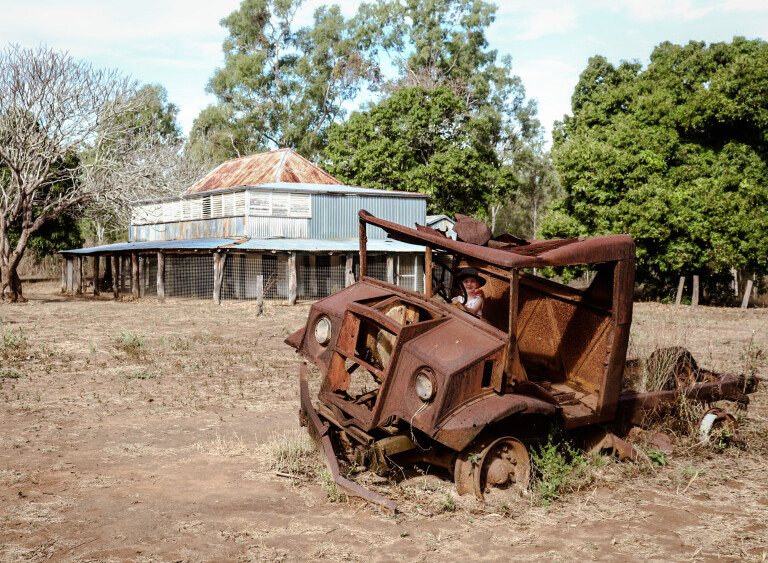
We toured up through Lakefield and met up with the PDR to spend a night at The Bend at Coen before heading on to Chilli Beach. To be honest, we felt like we didn’t give Chilli Beach a decent go due to bad weather, and the girls being ready for a shower and washing machine.
Chilli Beach could be a great little campsite to chill out for a few days and we also missed checking out Portland Road and The Temple WWII bunker accommodation nearby.
"The best part was crossing the Pascoe River, with a reasonably steep, rutted-out descent"
From here, we dropped the ’vans at Archer River Roadhouse and hit the Frenchmans Track. This was our favourite track of all the 4WDing we did in the Cape. It is around 50km and we did it in around five hours, however that was taking our time having a few swims and a well-deserved beer at the end of it. It wasn’t an overly challenging track but an enjoyable scenic drive.
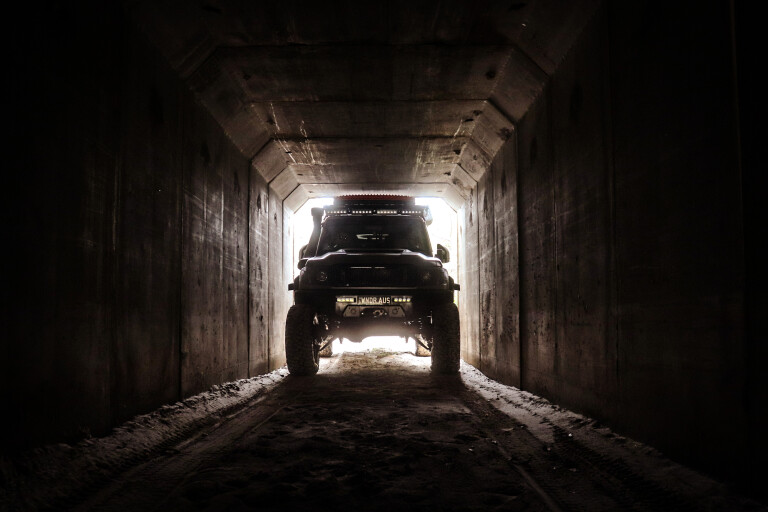
The best part was crossing the Pascoe River with a reasonably steep, rutted-out descent into around 50m of 1.2m deep water. It was easily managed by all the vehicles and the road after the Pascoe worked its way up on top of a sinkhole with some magic views for sunset.
We rounded out the first half of our Cape York trip with a few days in Weipa for a stock-up and refresh. Whilst here, we checked out the community of Mapoon and spent most of the day playing in the dunes at the beautiful Pennefather Beach. It’s torture seeing the stunning blue water and not being able to swim!
We finished our days at Weipa with fresh barra and chips at the campground and a few cold brews.
Next month, we’ll take you farther north on the famous Old Telegraph Track to the tip. Yes, we made it and yes, the 79 survived (we never had any doubts) and came out pretty much unscathed!
Part 23: Ol' Tele adventures
Well, here we go! We finally get to talk about the Old Telegraph Track and our time on this iconic adventure. The Old Telegraph Track (OTT) in Far North Queensland is one of the most famous four-wheel drive hotspots in Australia, along with the likes of the Vic High Country and the Gibb River Road.
An achievement so many are dying to tick off their bucket list, and let me tell you it was a great feeling relaxing in the waters of Nolans Creek knowing we had got through multiple obstacles relatively unscathed.
There are a few different ways to tackle this terrain, but our plan was to take it slow heading up to the tip. We started at South Tele, completing it in two sections over two days with a small break in-between. Most people do the Tele south-to-north and then follow Bamaga Road down from the tip; however, if you’re up for the challenge, you can go against the grain, north-to-south.
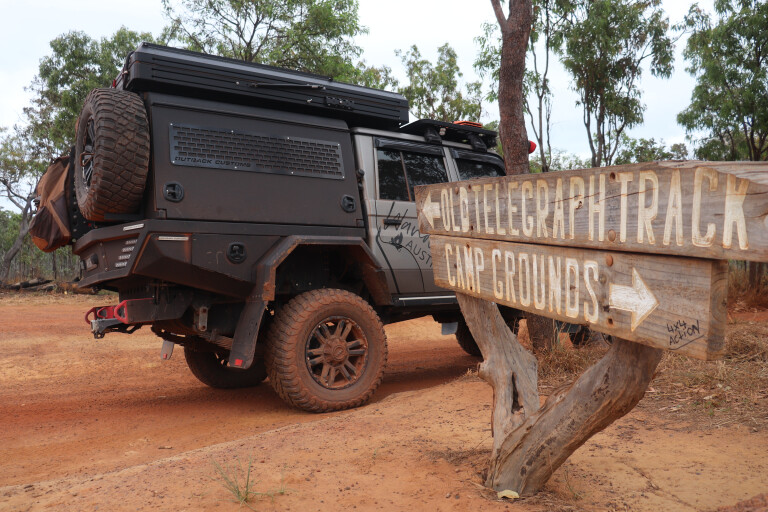
As well as being great 4WDing, the OTT is rich in history and we loved learning about how many people from different cultures survived this harsh terrain. Nikita spent most of her time in the passenger seat studying the Hema Cape York Atlas & Guide and can’t recommend it enough.
The OTT is what is left of the Cape York Overland Telegraph Line completed in 1887. It extended from Laura to Thursday Island, operating until 1962. This is a reasonably tough track in the 21st century, let alone back then, and we can’t count the number of times we said: “Gee, imagine what this was like on horseback.” After all, it took the initial surveyors three months just to get to Somerset Station.
You can still see all the telegraph poles along the way, and it is maddening to see that most of them have been vandalised. We just can’t understand why people have to damage history and ruin the experience for others. There is a rumour that there are one or two original timber poles left on the track, but we couldn’t spot them.
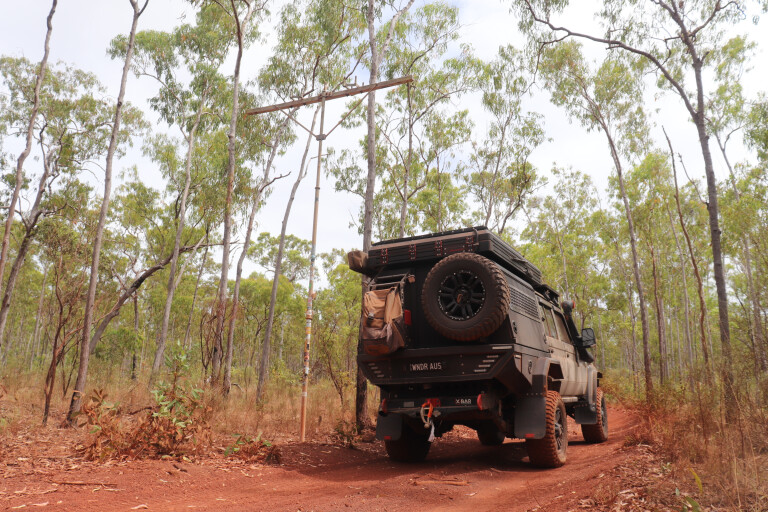
We had a couple of days at Bramwell Station to recuperate and prepare for a few big days in the car. The boys made sure tyres were checked, pressures were right, air filters cleaned and weights were reduced, while the wives refilled snacks, ensured iPads were charged and caught up on washing. How cliché!
The South Tele Track was a big day and, when we do it again, we will probably camp along it rather than travelling back to Bramwell. The two sections of the OTT are quite different; the southern section is longer, a lot of steep creek descents, obstacles and it’s quite dry, while the northern section has more water crossings but a shorter distance overall.
Starting at the famous sign at Bramwell Junction, the first obstacle is Palm Creek and it comes upon you quite early in the drive. You could spend most of a day hanging out here watching all different vehicles taking on this challenge. From all reports, this was by far the most challenging obstacle of the OTT for 2022.
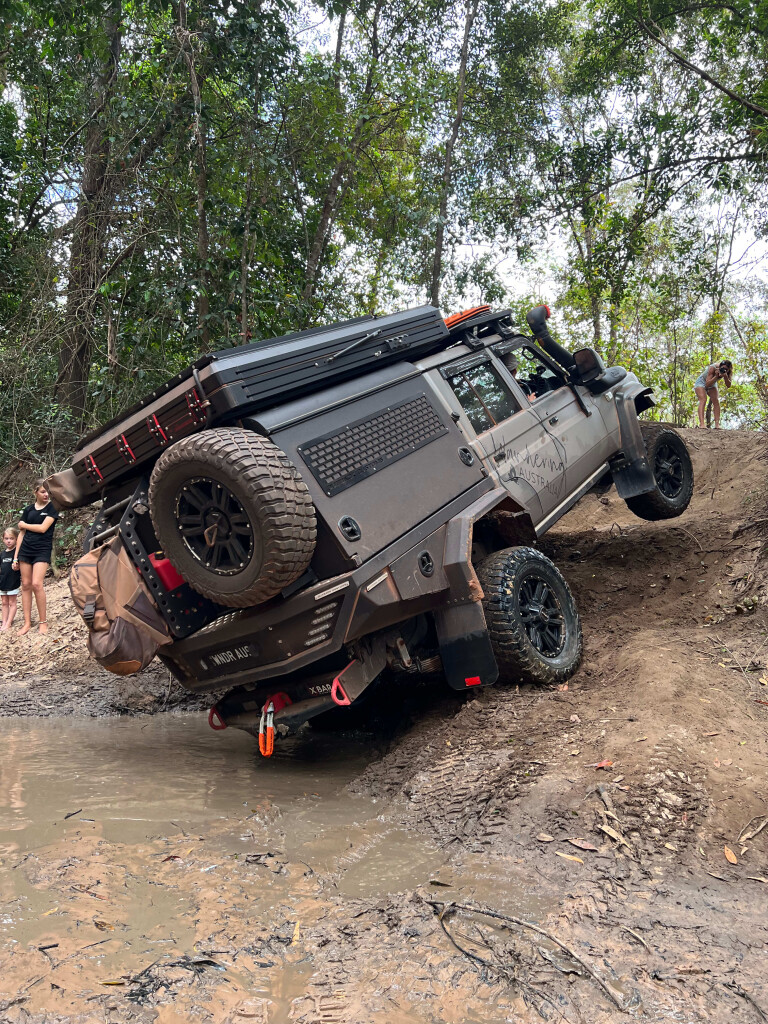
There are around five different entry/exit points and it is very much a choose-your-own-adventure scenario. Everyone, except the big girl GMC, tackled the main drop in at Palm and we all nailed it! It’s a steep 3.3-metre, 90-degree drop with 50mm clearance either side of our guards, so it’s ideal to have a spotter, a handheld two-way, some good brakes and be keen to drive standing up!
All things that go down must come up and there are a few different options to get out of Palm Creek. You just have to choose which is best suited to your vehicle, equipment and 4WDing capability.
Next along the way was Ducie Creek – an easy little creek crossing with a small drop-in, but we still managed to lift a couple of wheels. A few little creek crossings later and we had hit Gunshot by lunchtime. Gunshot Creek is part of what has made the OTT so famous, and it has clearly been well used. There are drop-ins everywhere and the original drop-in is no longer accessible. Again, the boys each chose their own adventure and got through with minimal damage.
The main drop in at Gunshot is truly insane. Due to our weights, we opted to go down some of the surrounding ‘chicken’ tracks, but these still got the old ticker going. The exit of Gunshot is quite an articulated section, but it’s nothing too crazy and easily achievable.
After Gunshot, there are three other small creek crossings, and that was the South Tele done. It took us around six hours to do the South Tele Track with plenty of stops along the way, before we followed Bamaga Road back to Bramwell Station. All up it was a 12-hour day, but heaps of fun.
Bamaga Road is not exactly a smooth ride and you get pretty used to rattling along on the corrugations. For this road, we dropped tyre pressures to 22psi to try and buffer against the car getting a hiding. We certainly noticed the three weeks difference on the way back along Bamaga Road than on the way up. It just gets so rough and the corros are as deep as Elon Musk’s pockets!
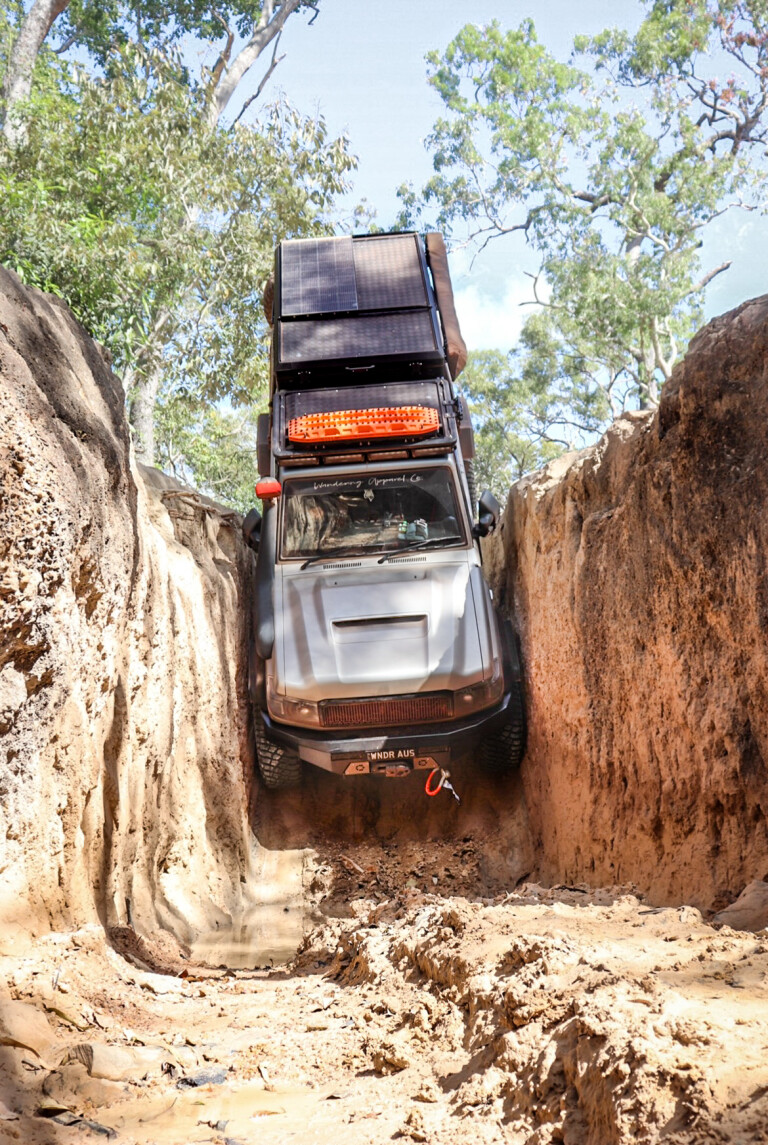
The following day, we headed up the same road once again to get to Elliot Falls for the second half of the OTT; so yes, we did a bit of backtracking, but that was what worked for us, our families and our set-ups. The South Tele was a challenging and super fun day and we all did so well overcoming the obstacles with skill and finesse.
Be sure to pack the following essentials for your car when tackling the OTT, and Cape York in general: a winch, recovery kit, a set of MaxTrax, a snorkel and have at least a two-inch lift.
We had planned to talk about the whole Tele this month, but there is so much to tell you all – so we will let you know about the northern section next time.

COMMENTS